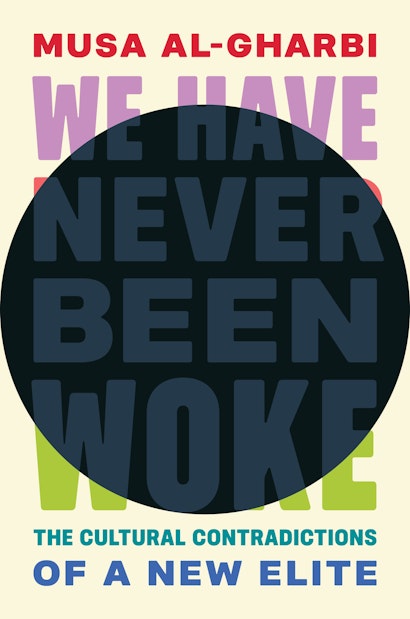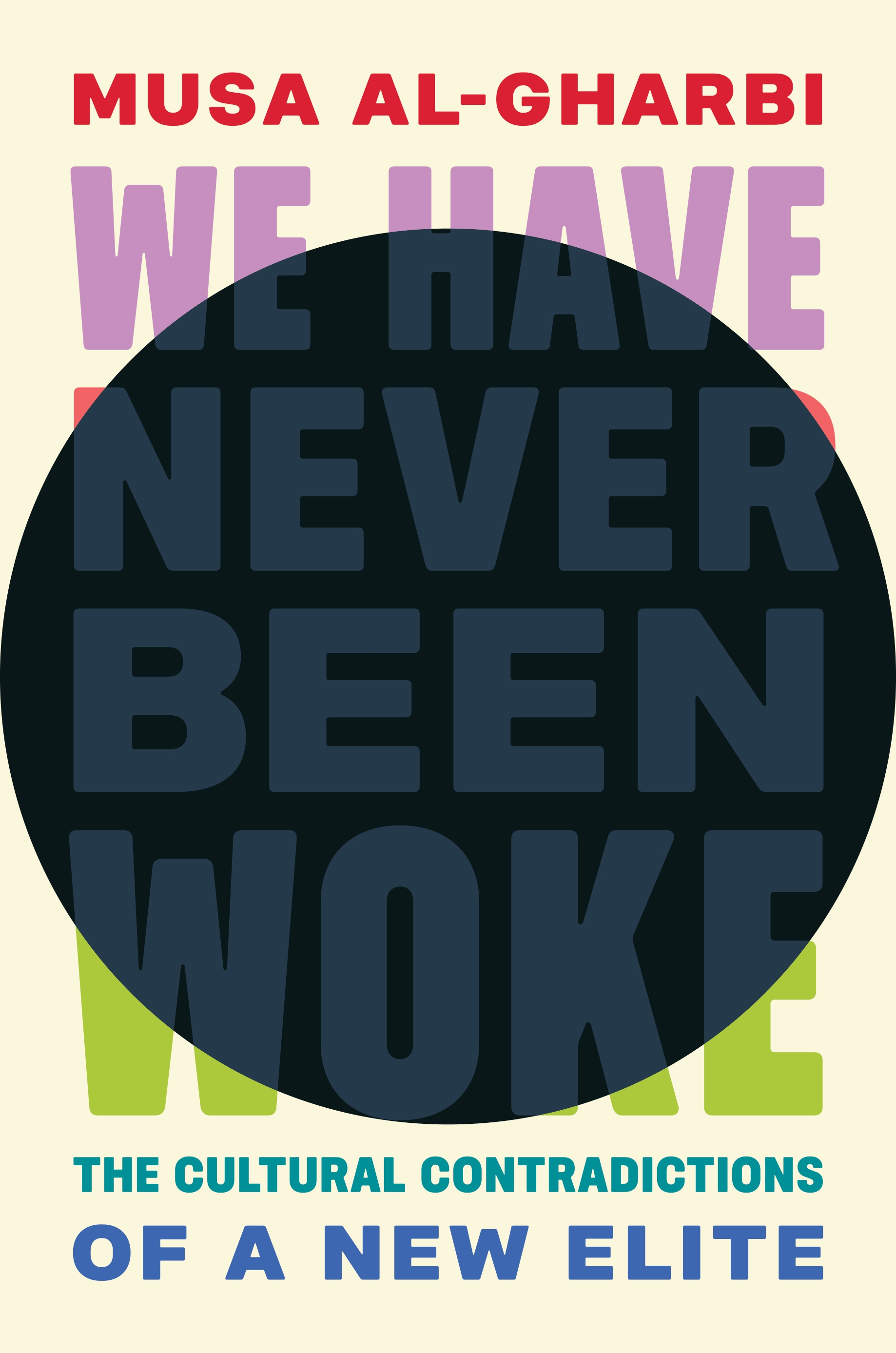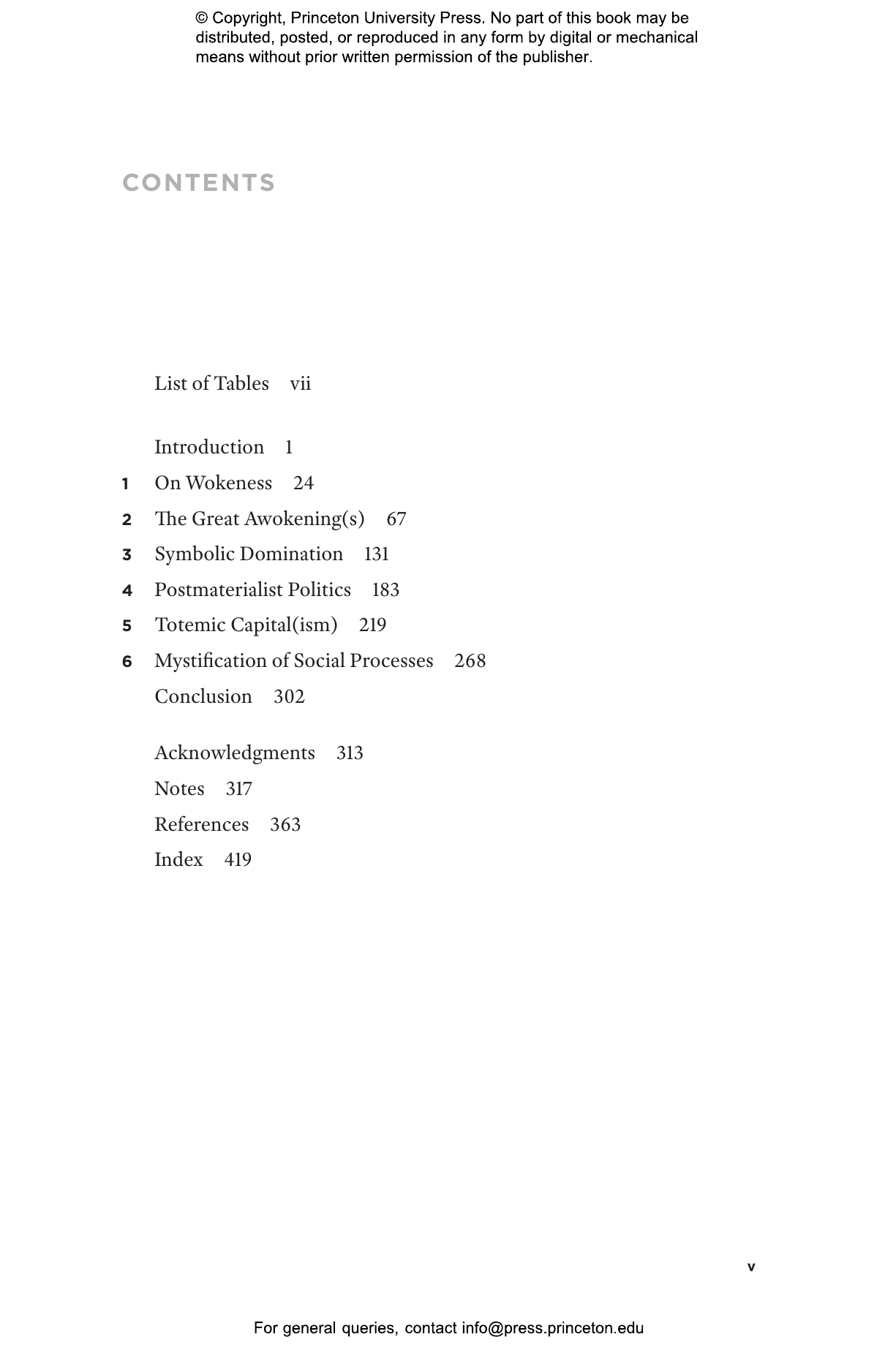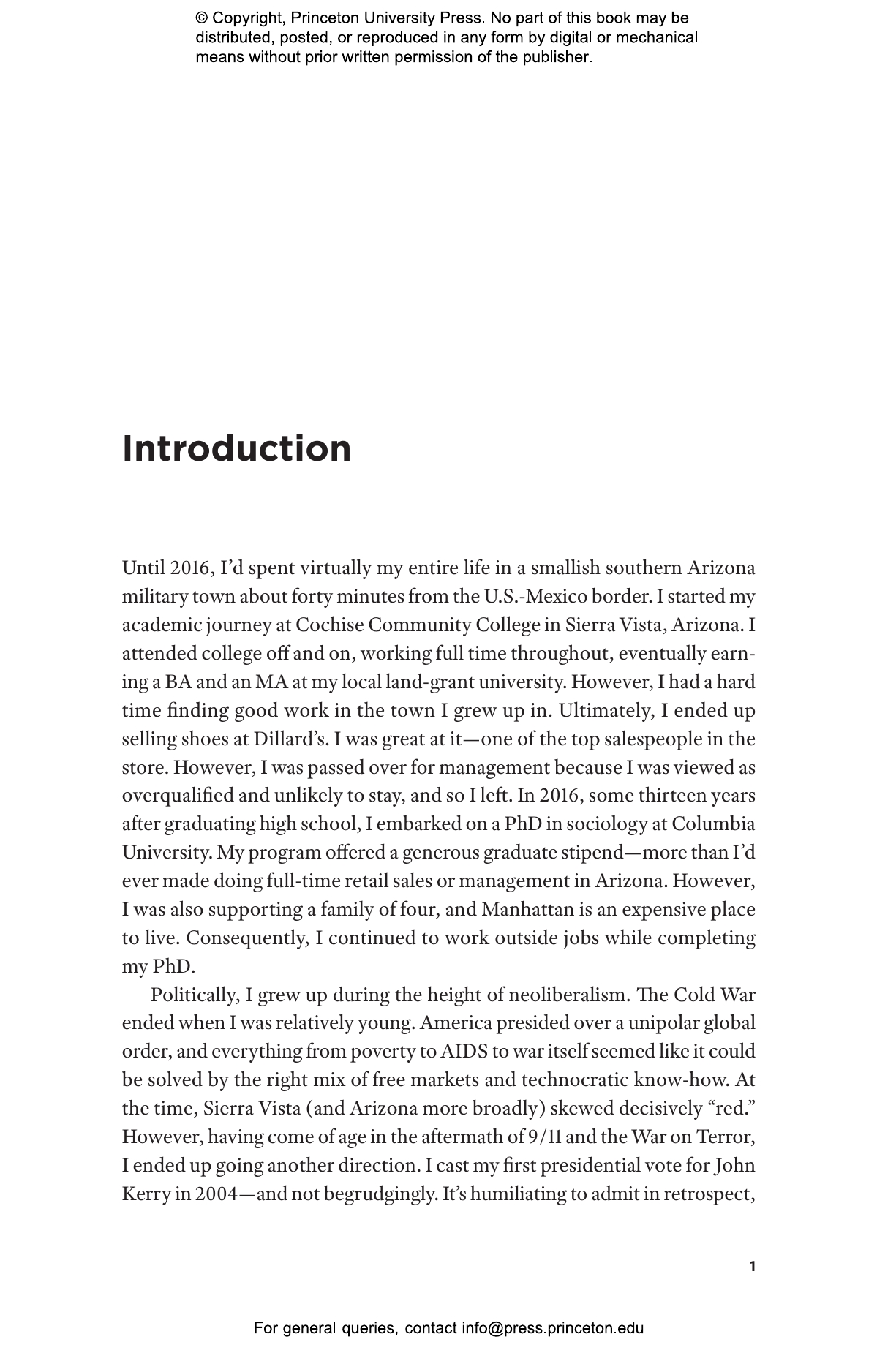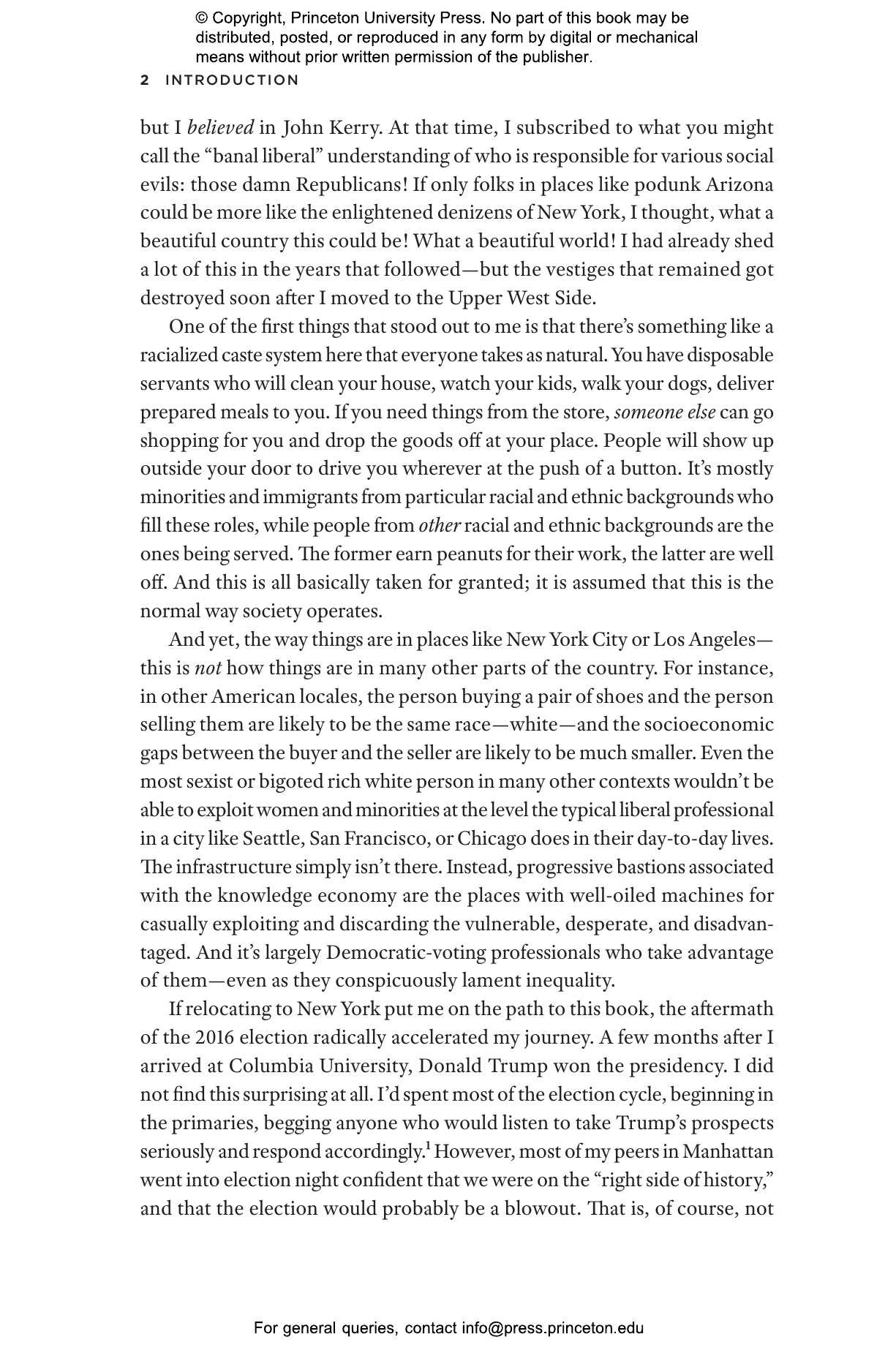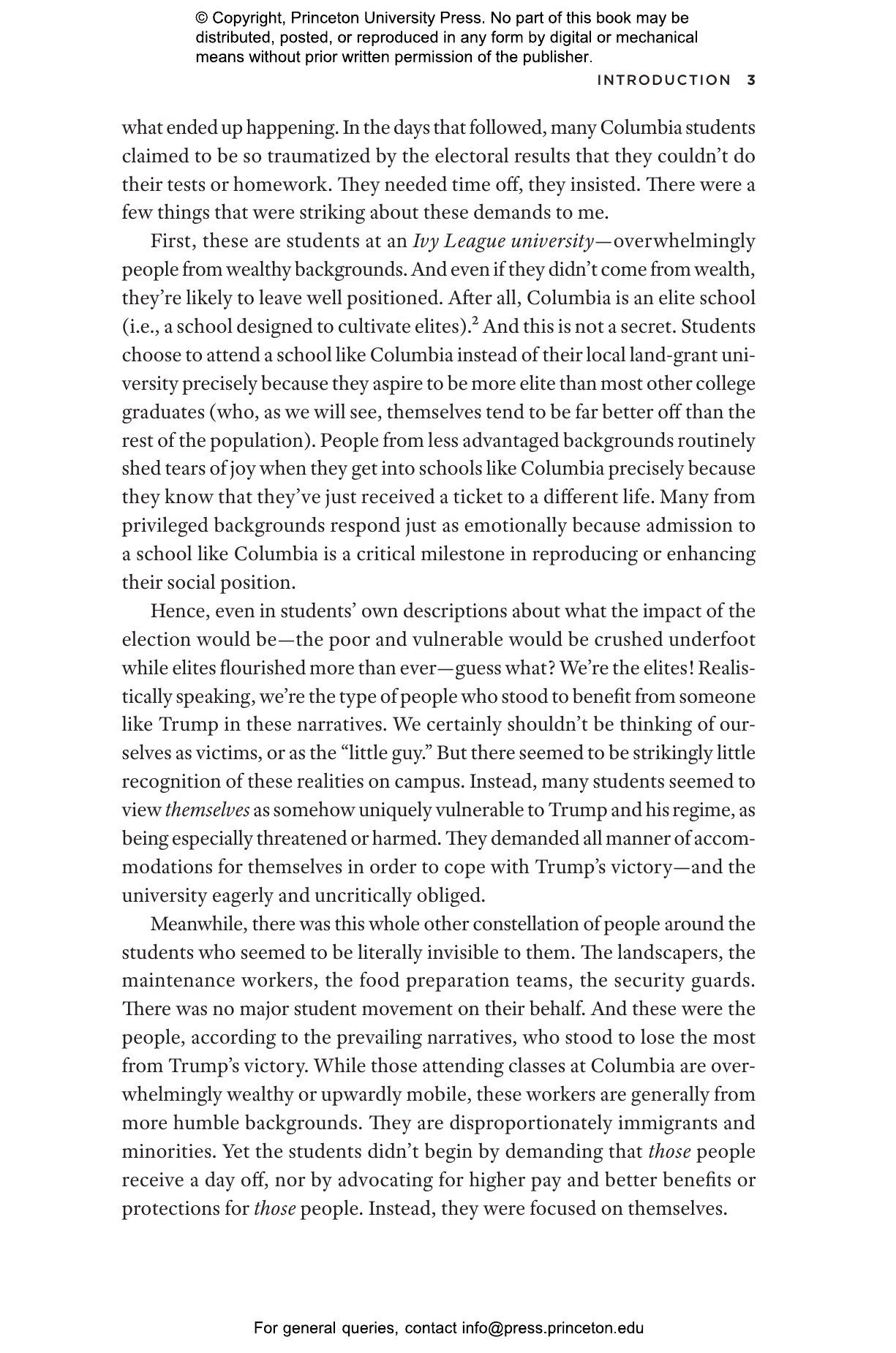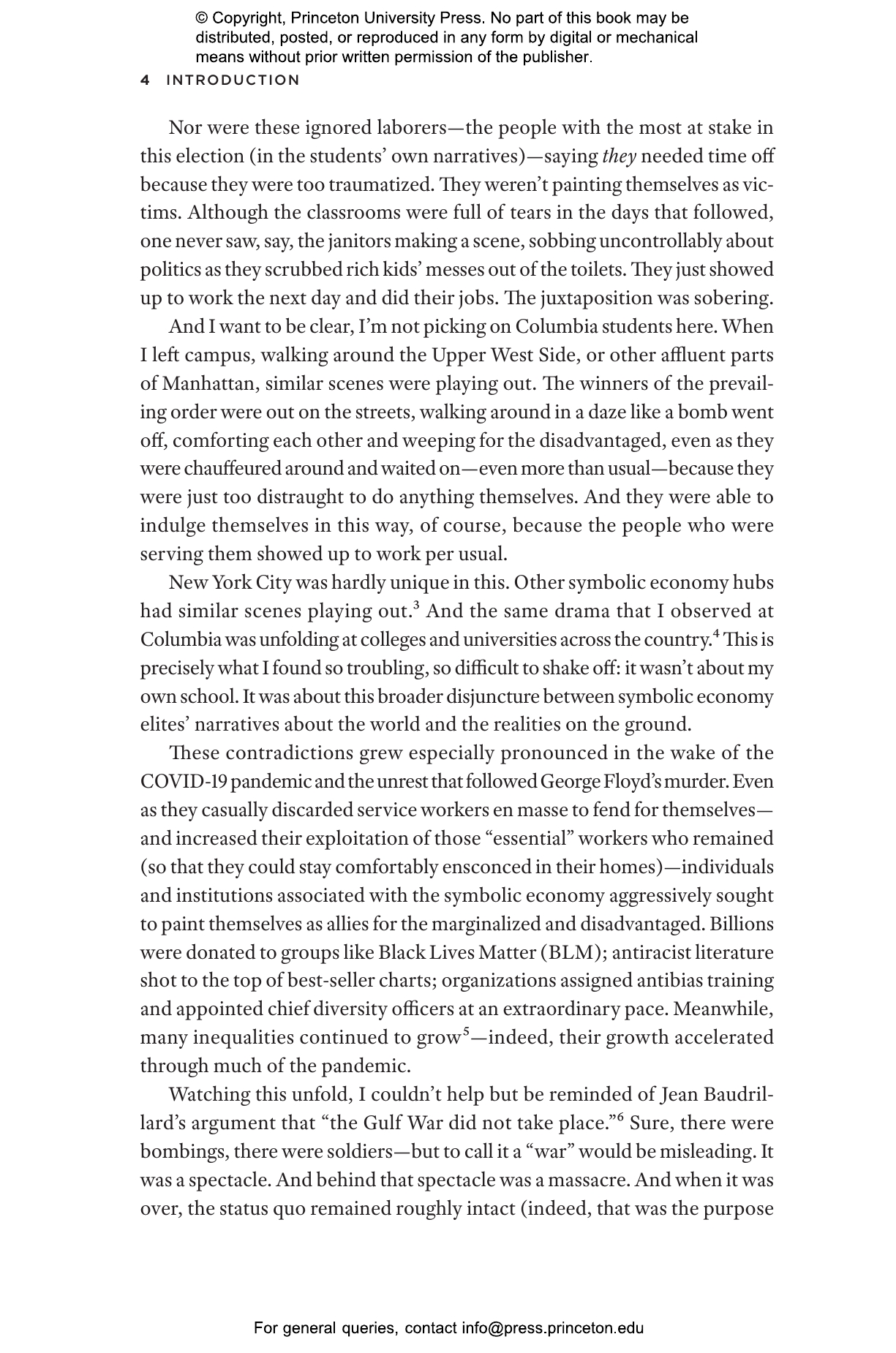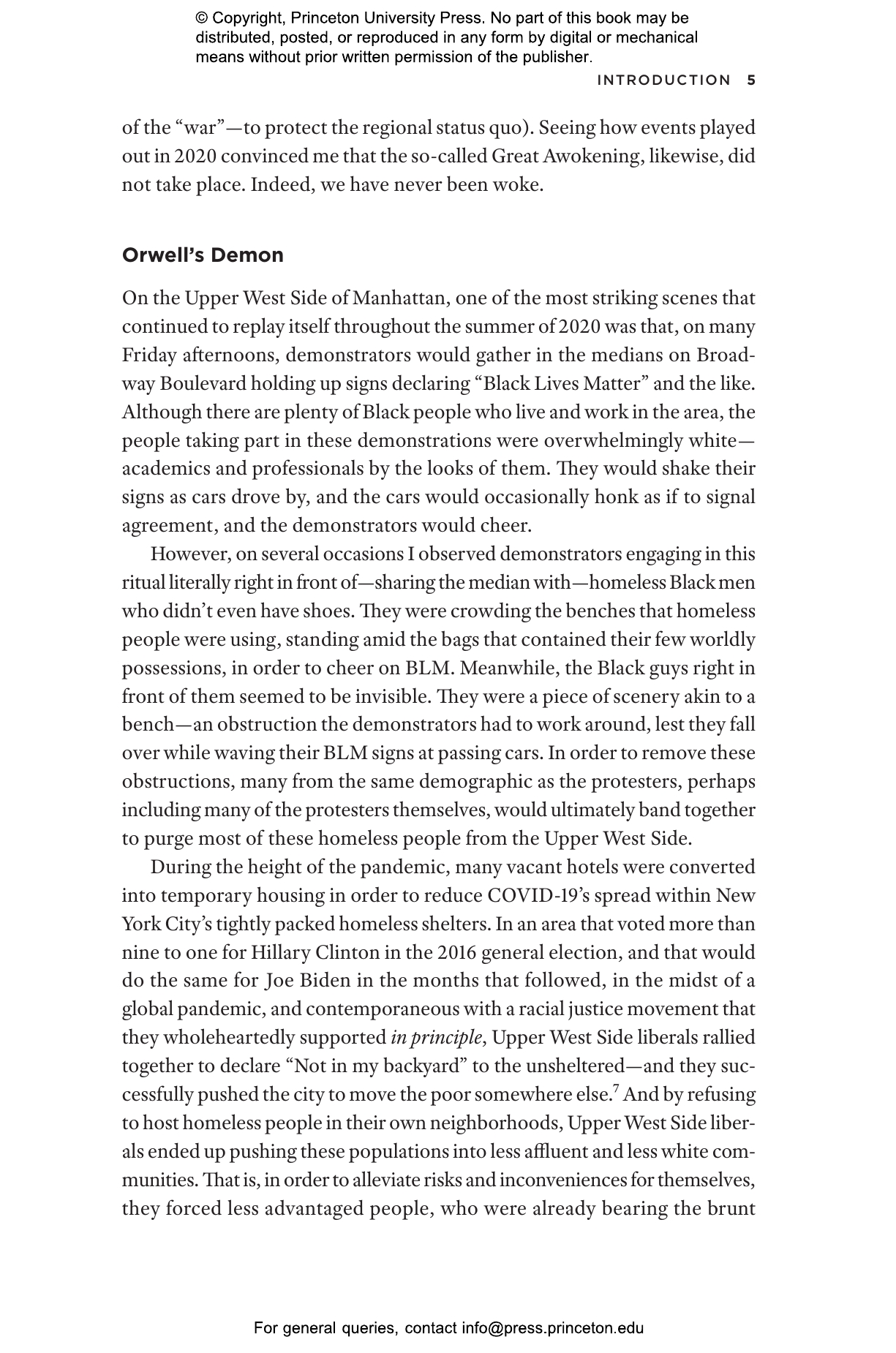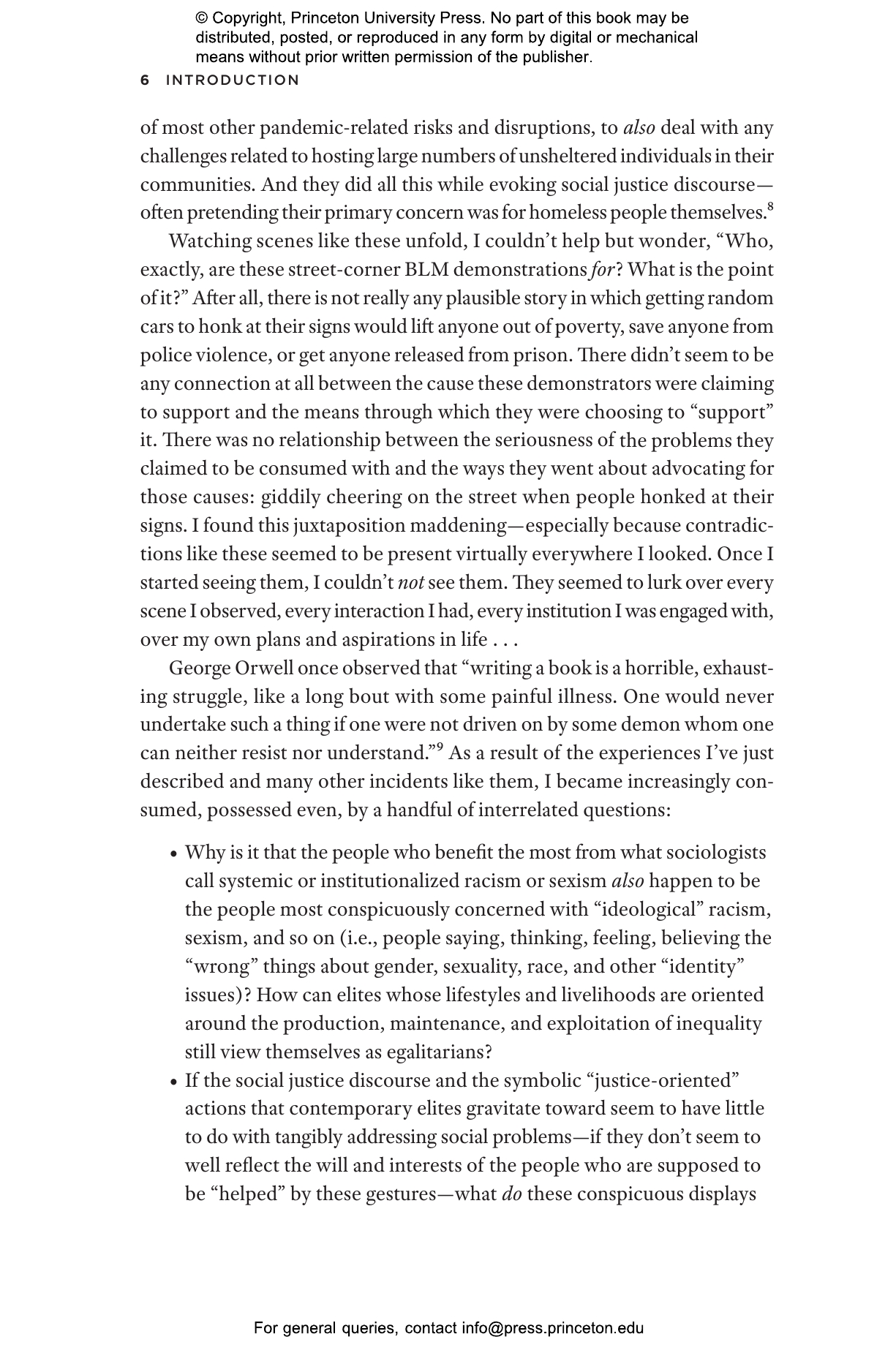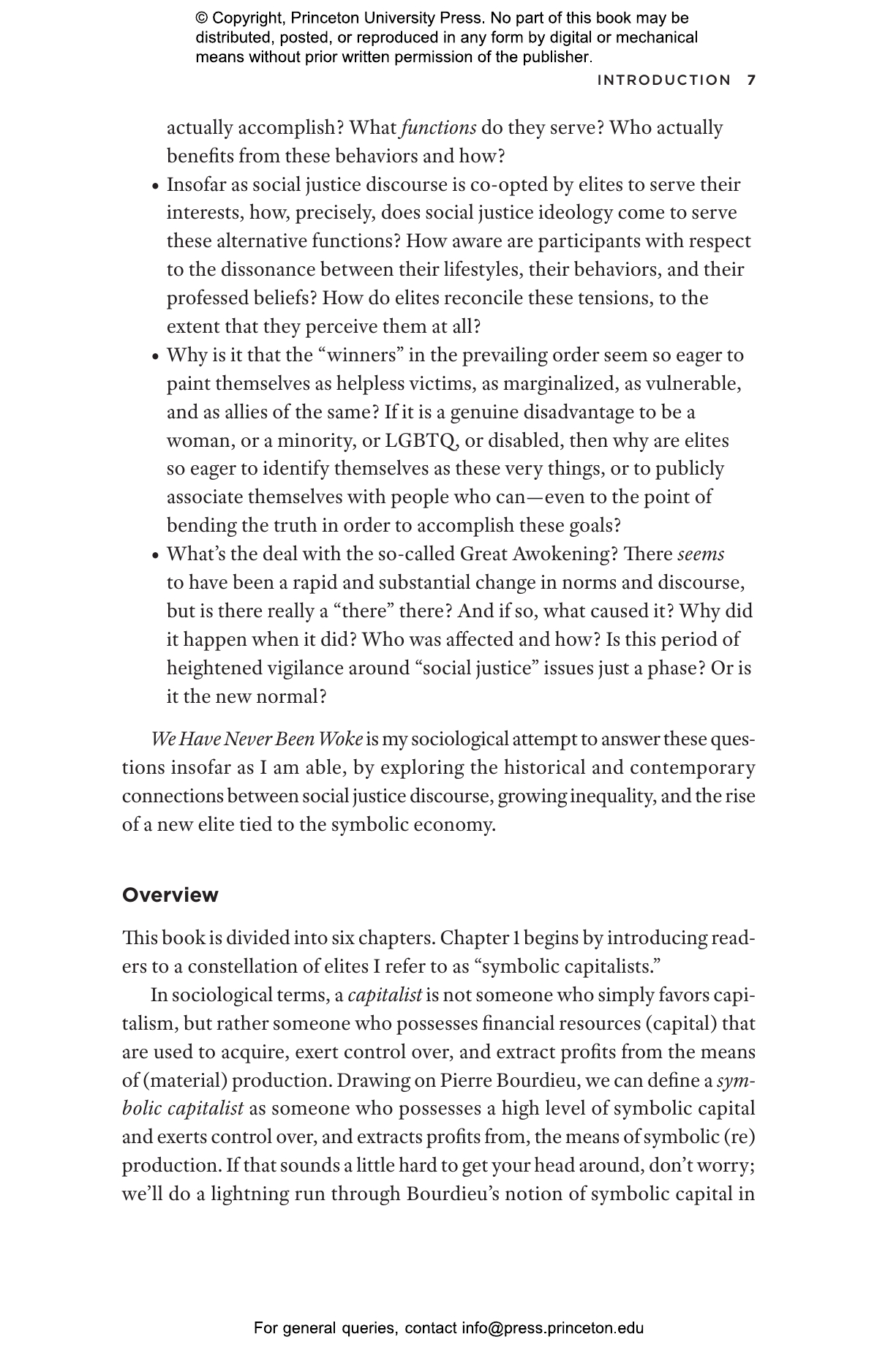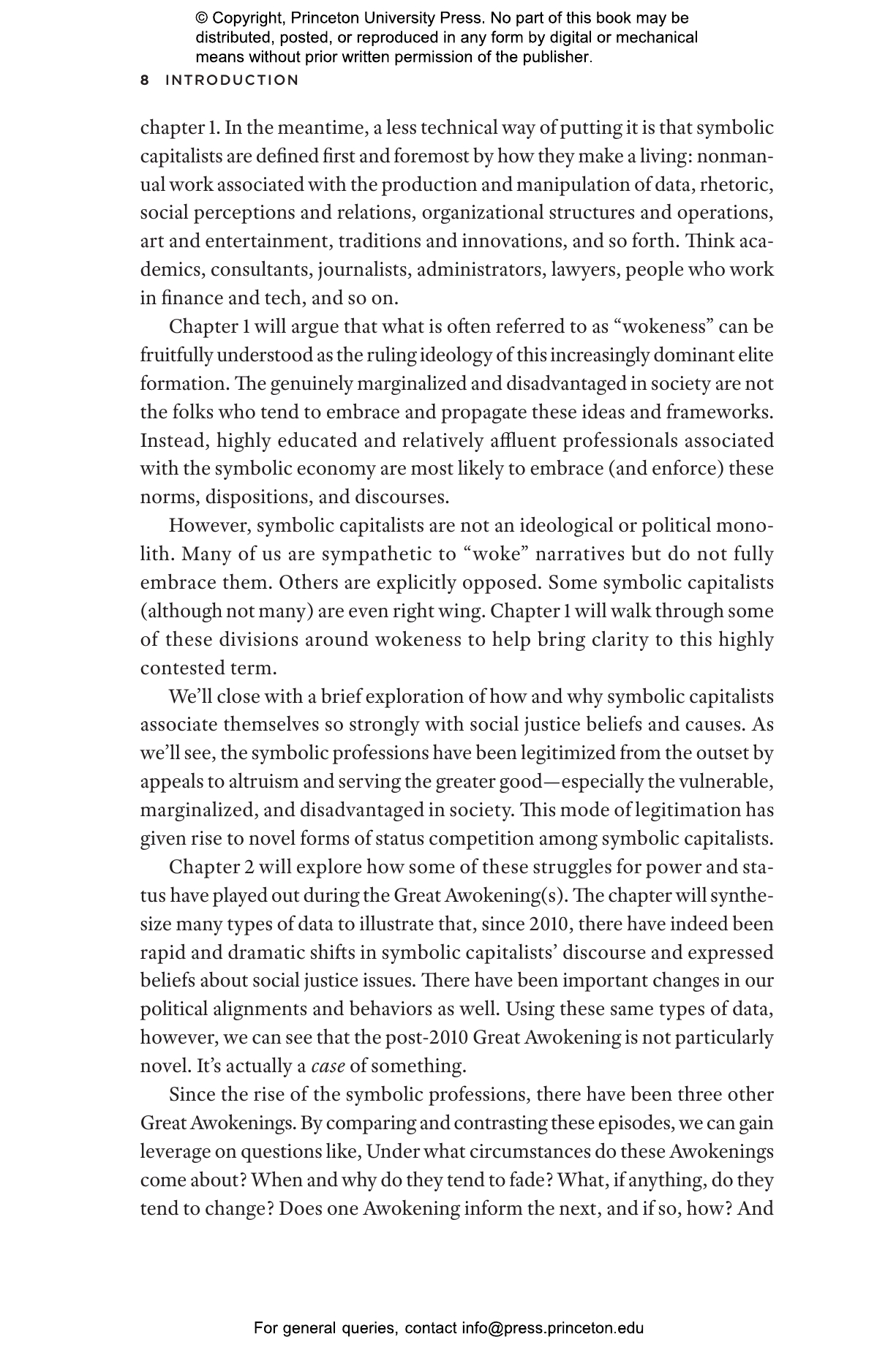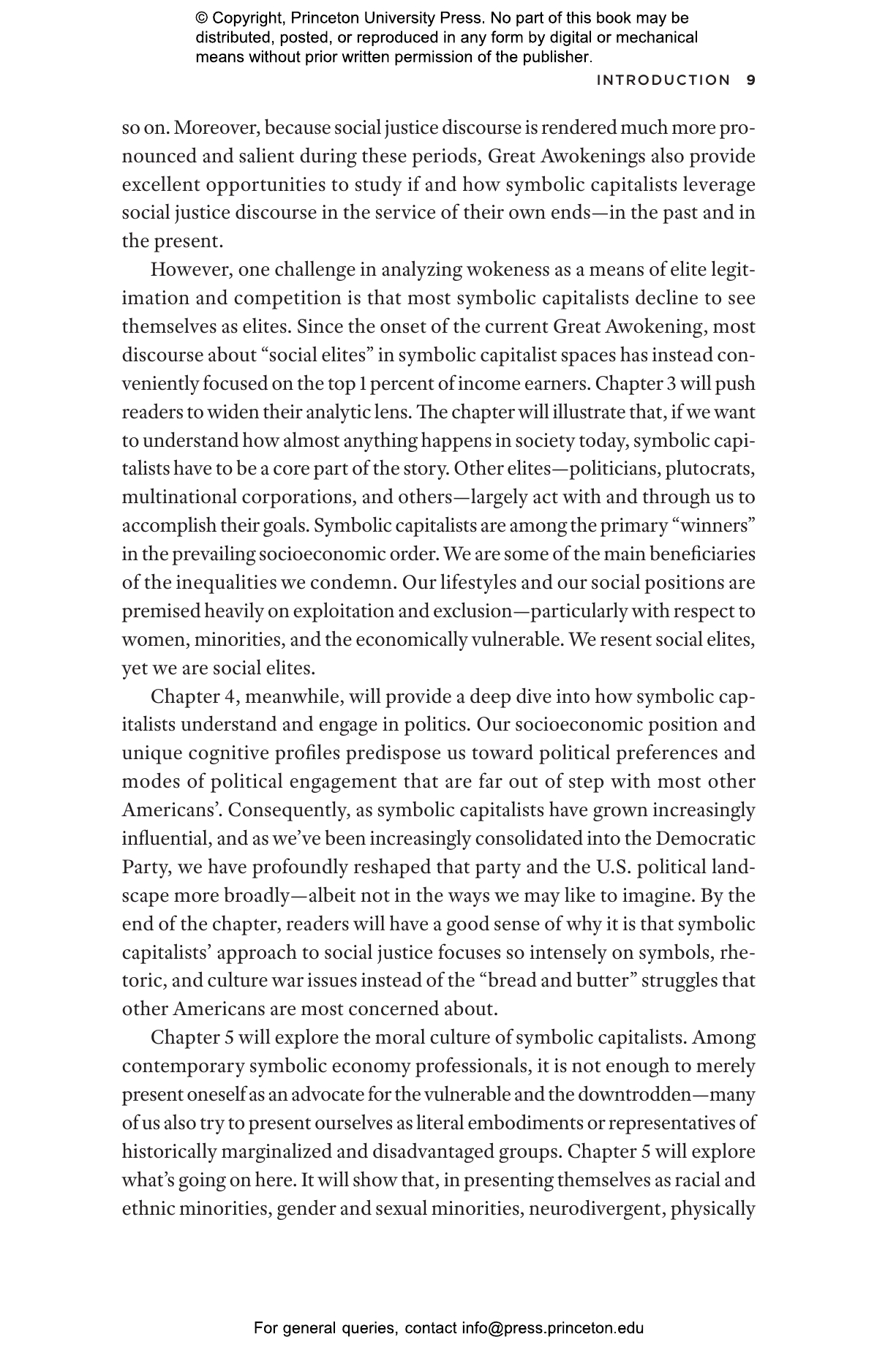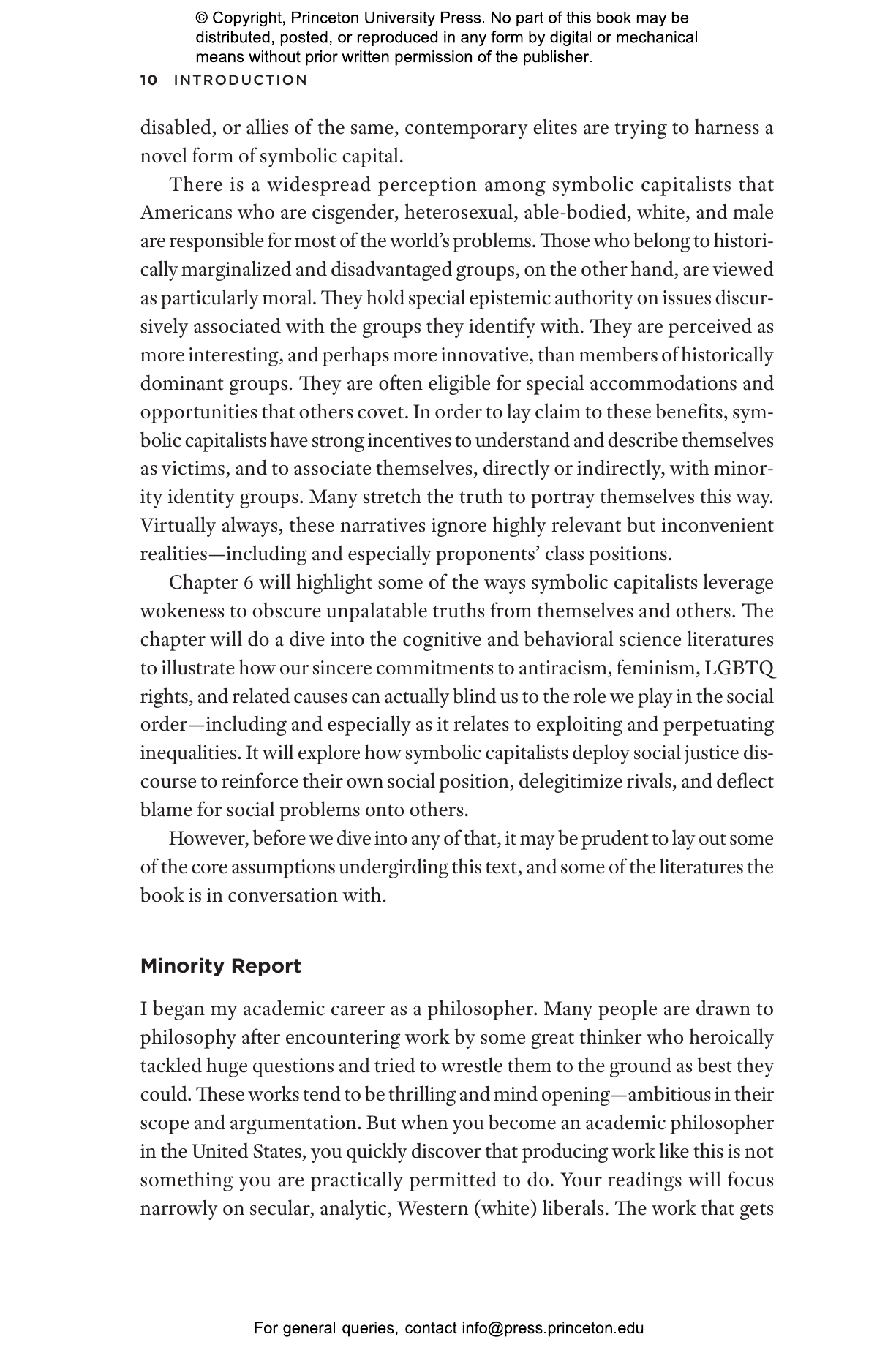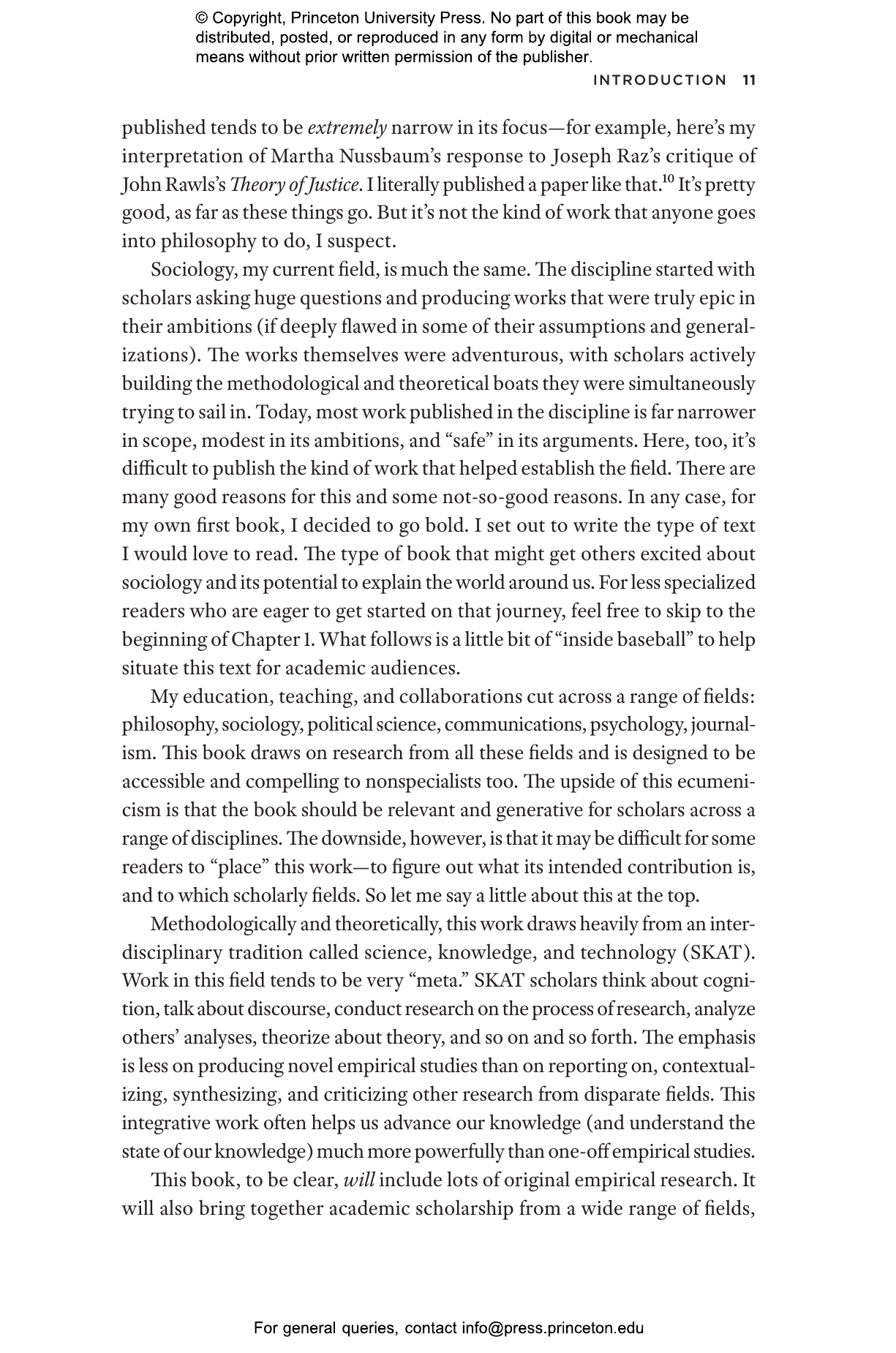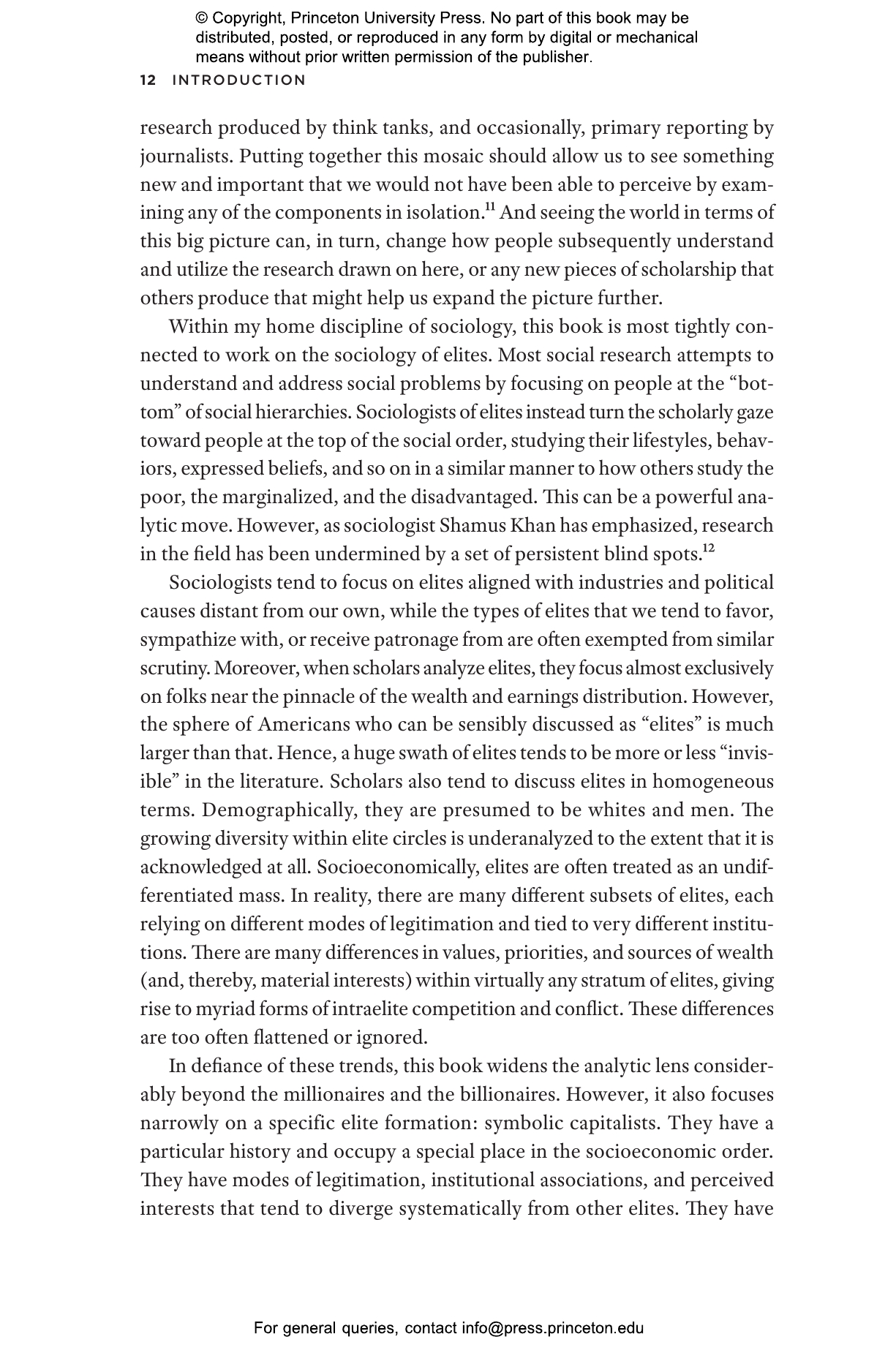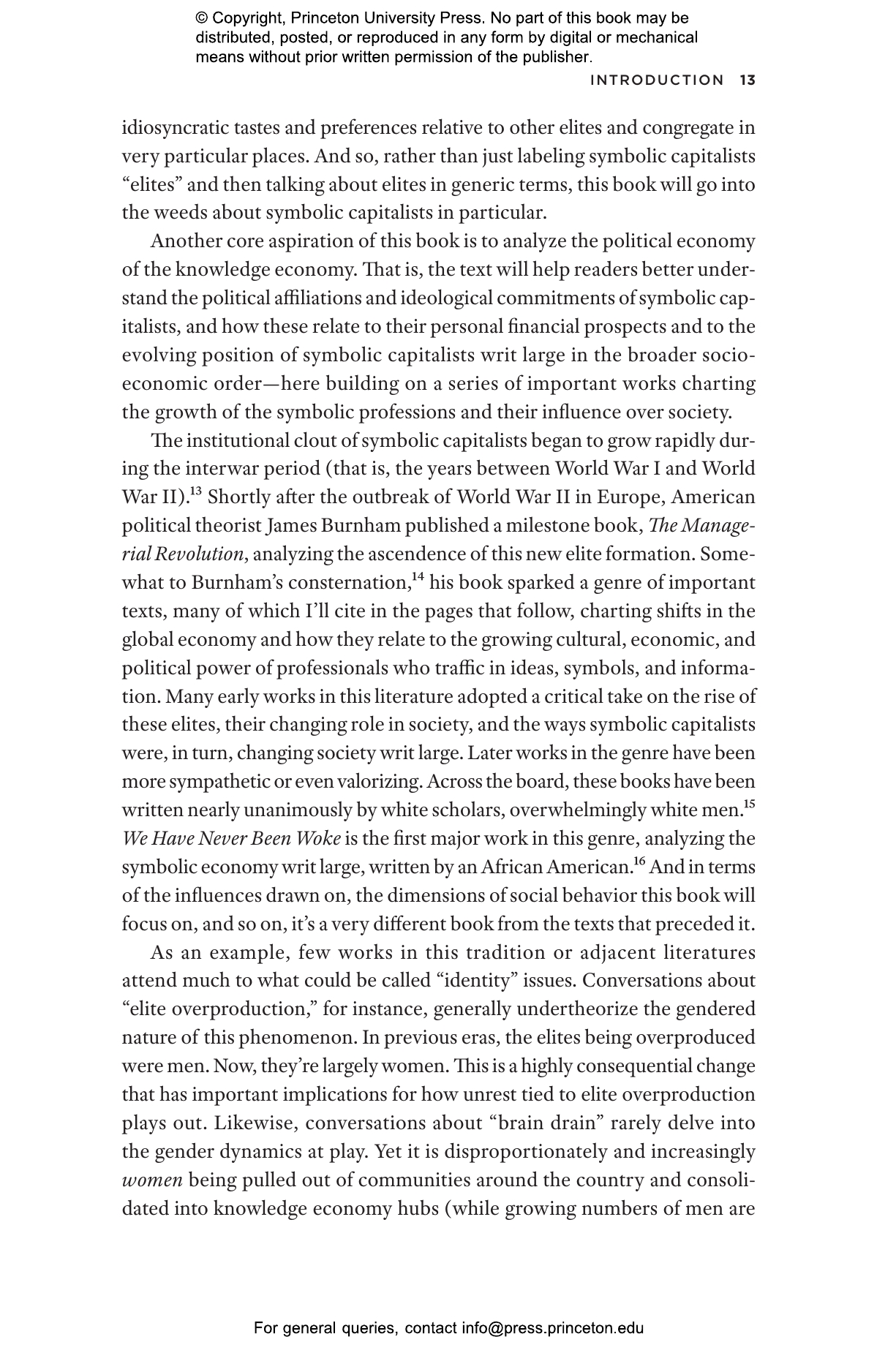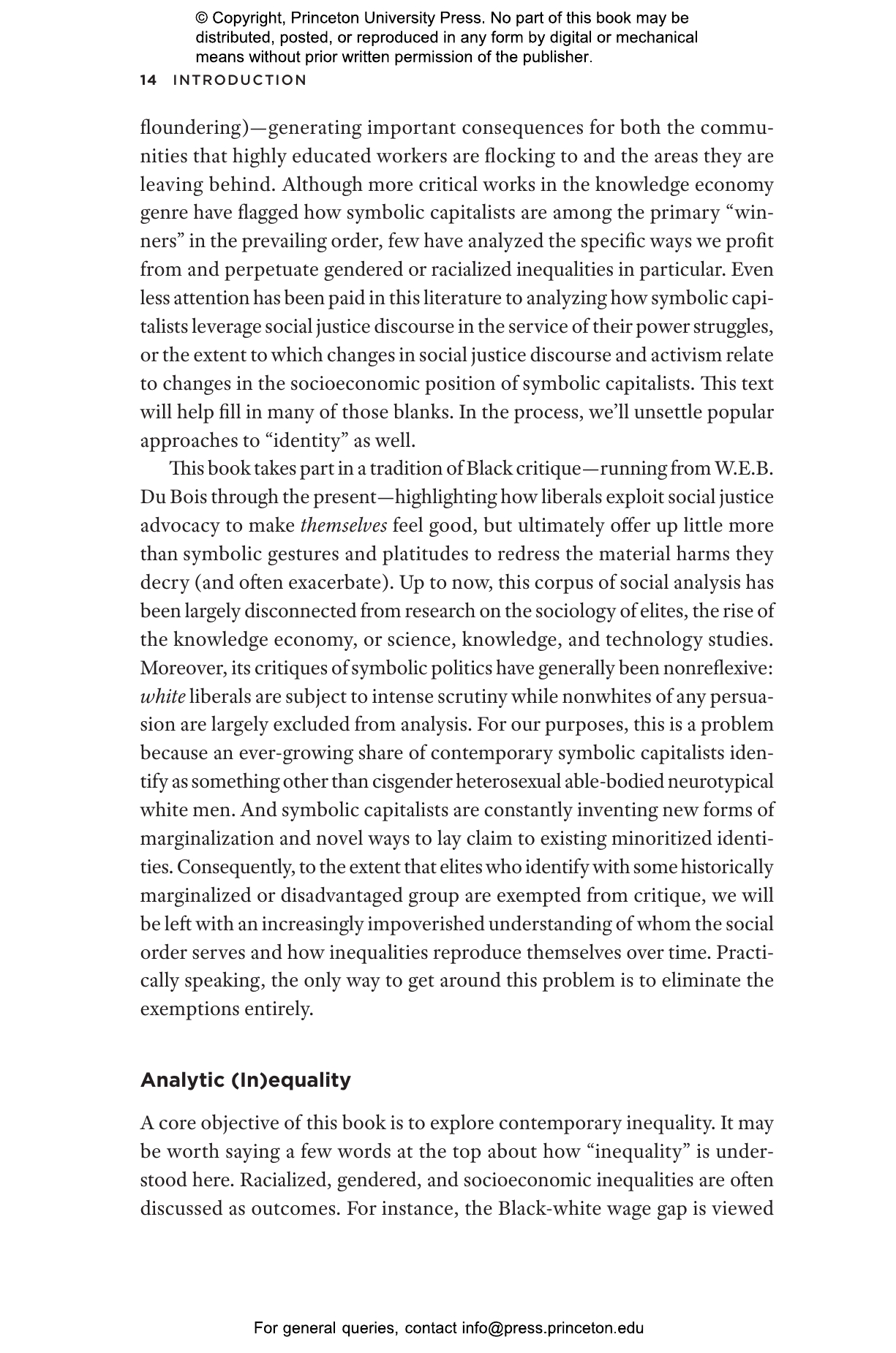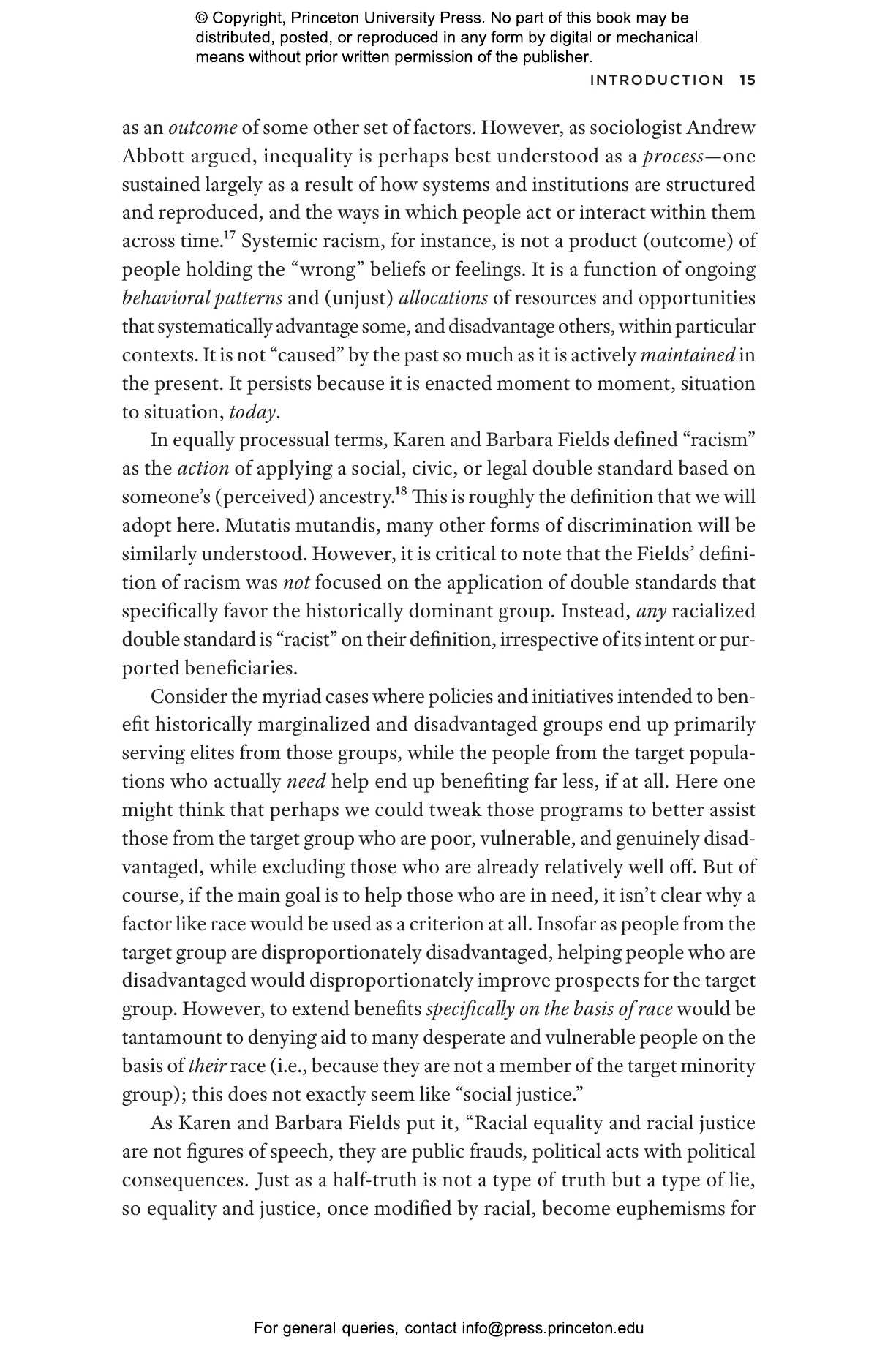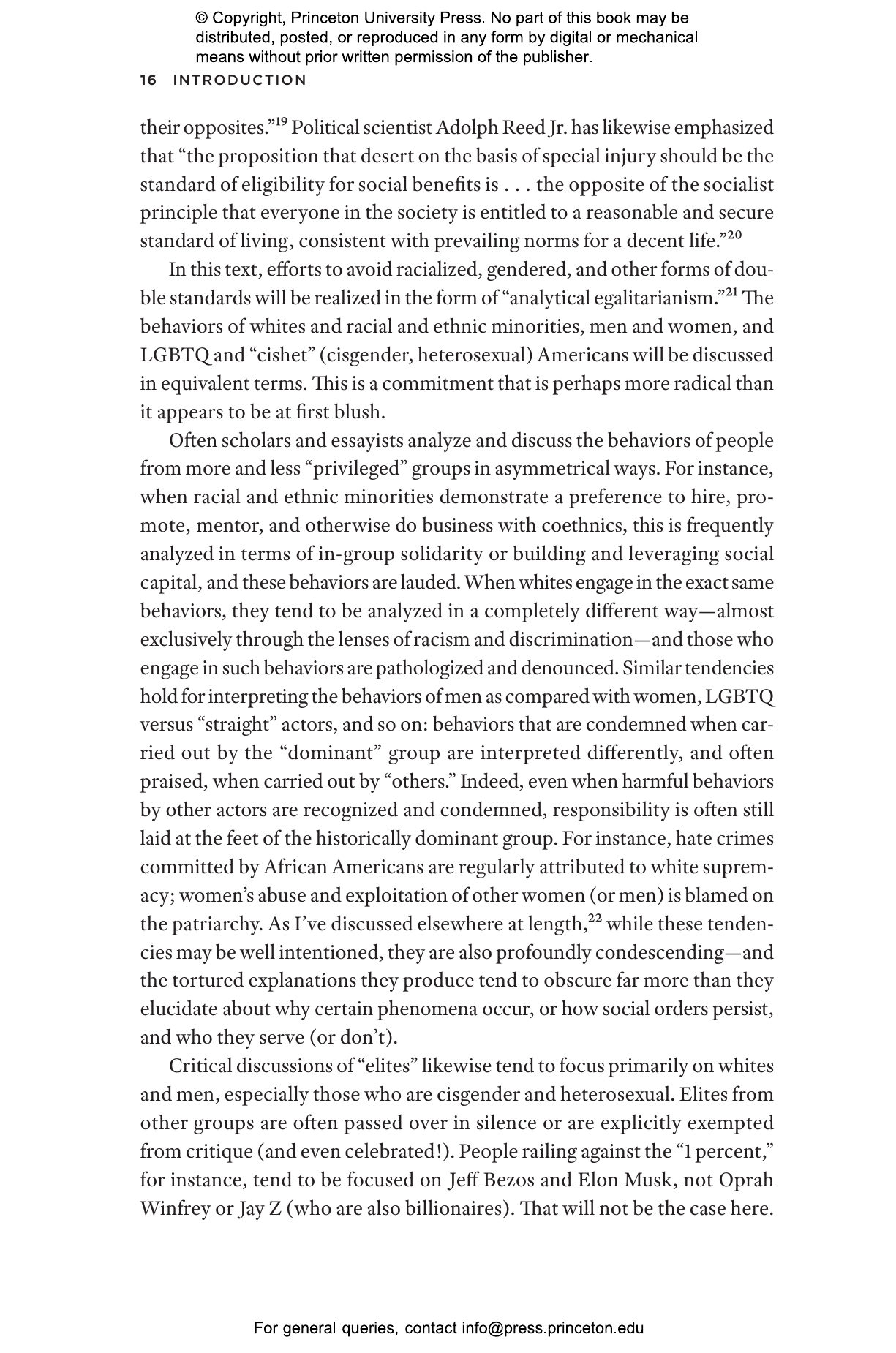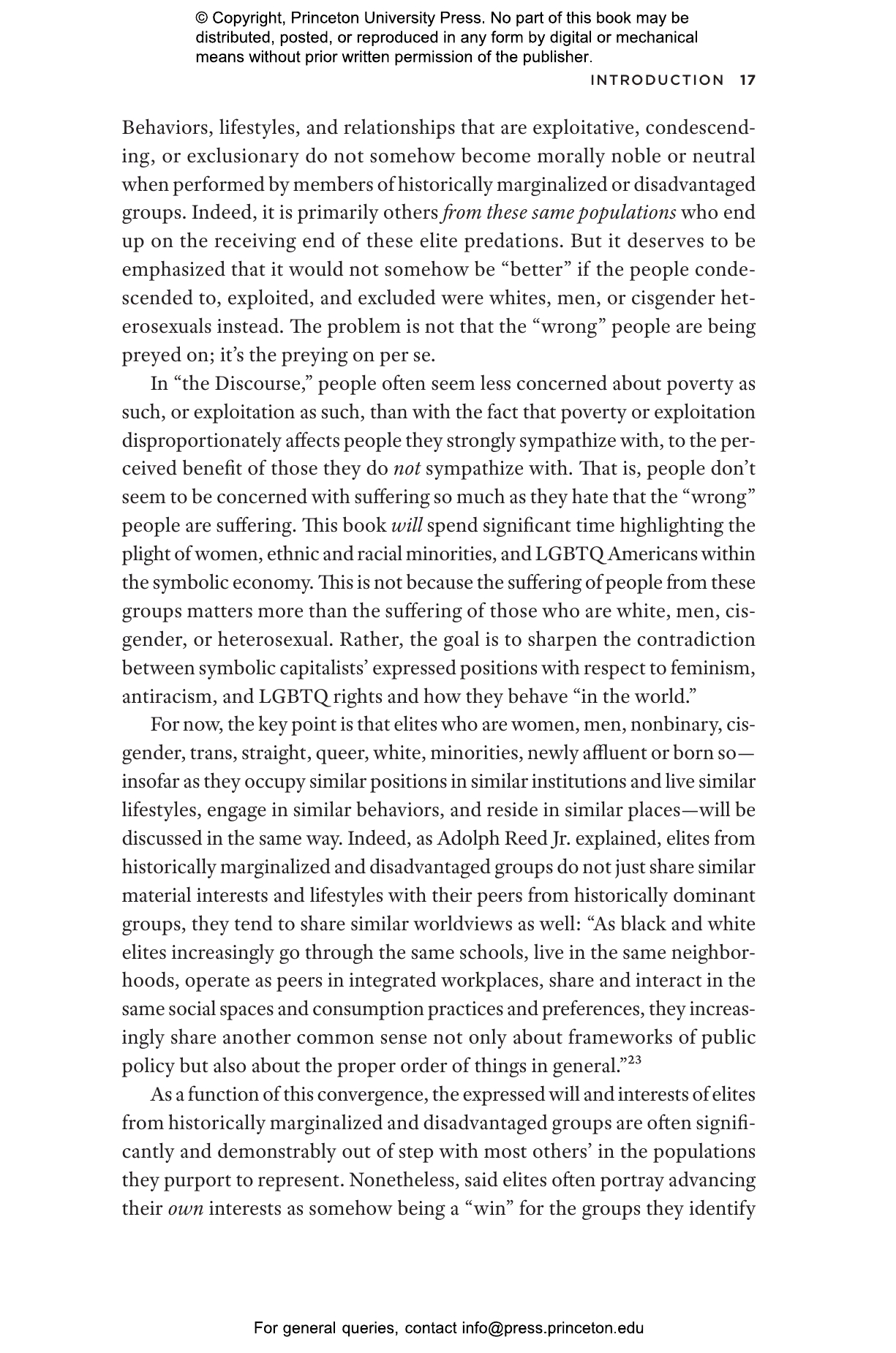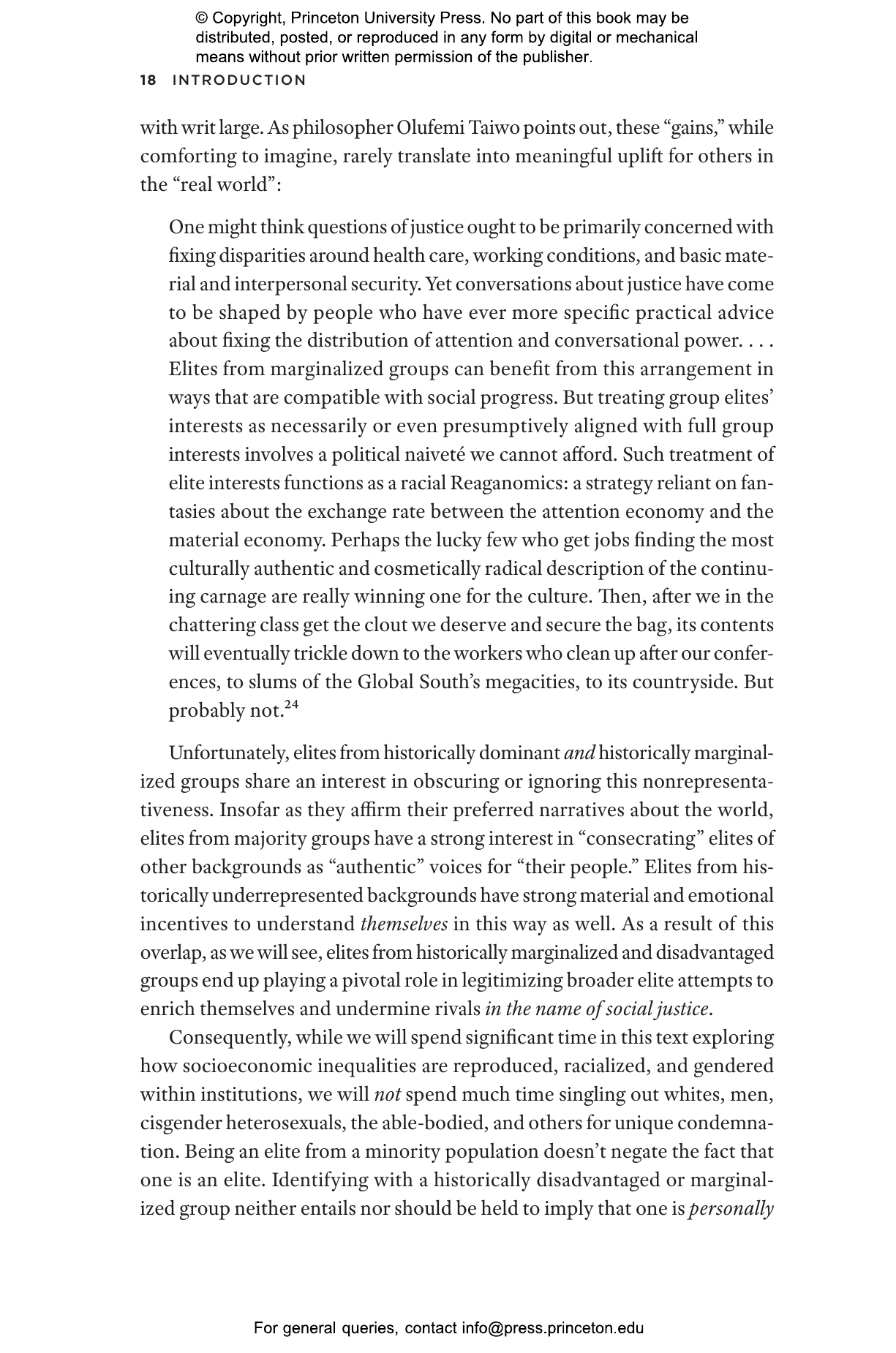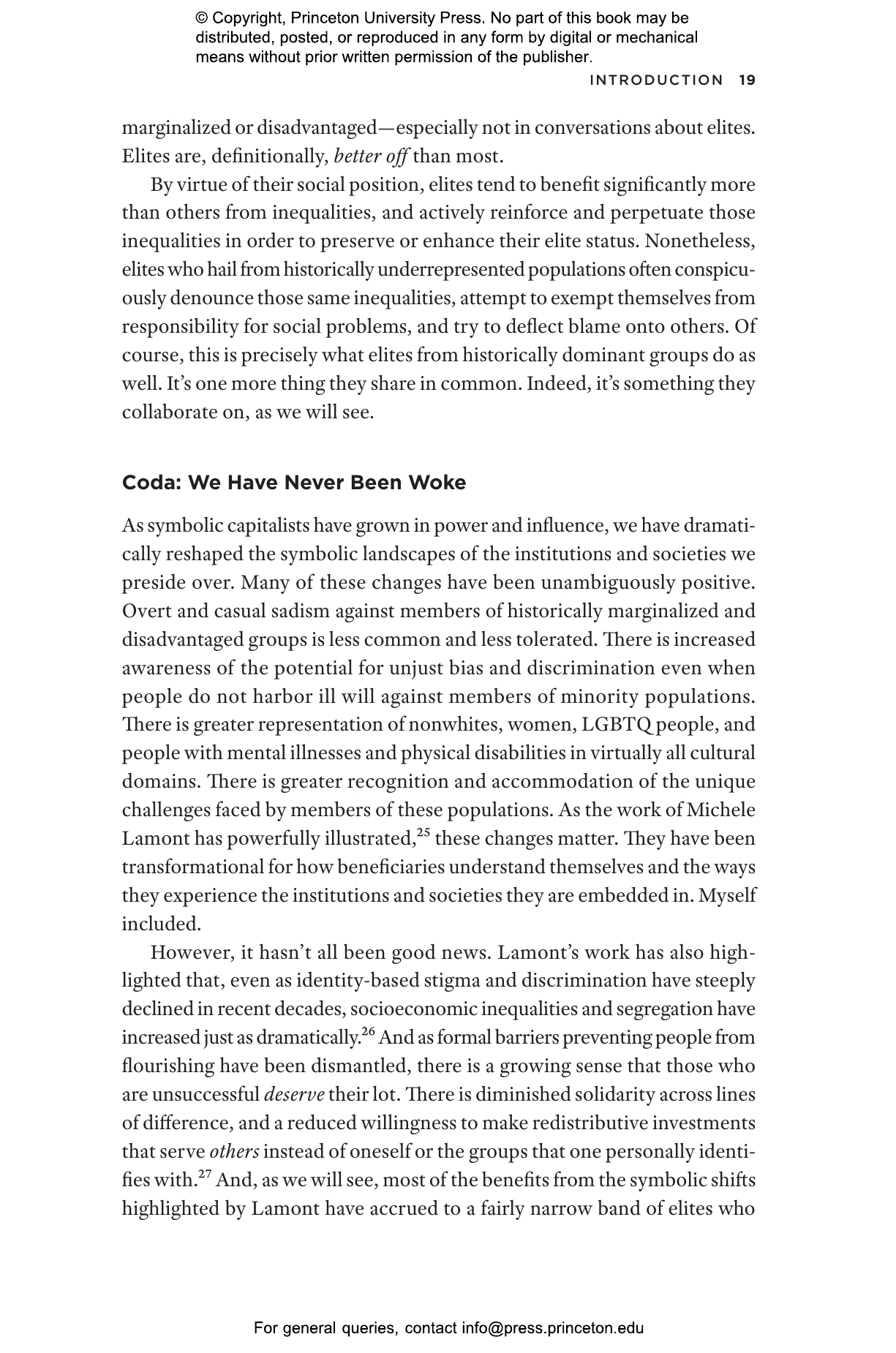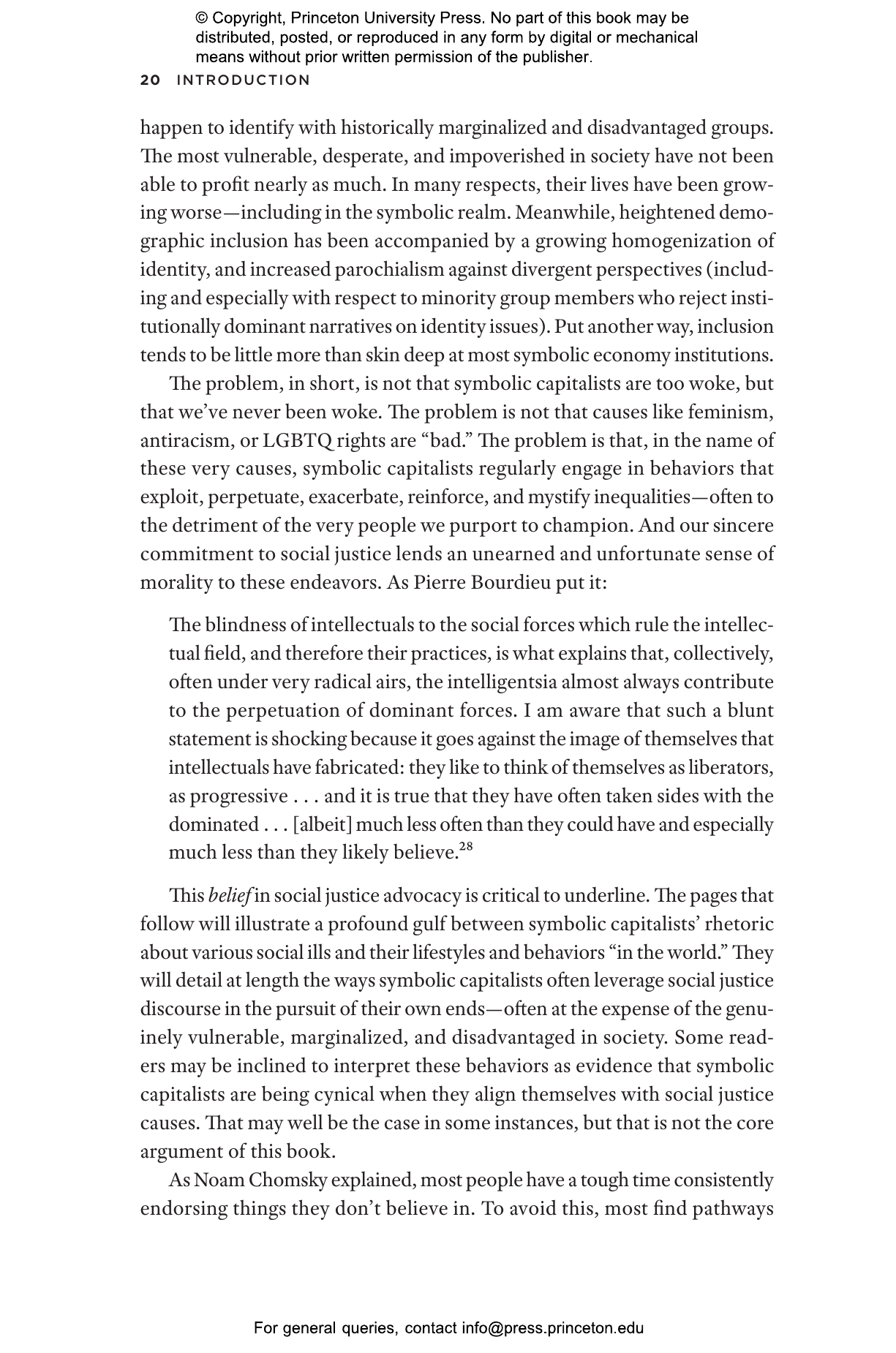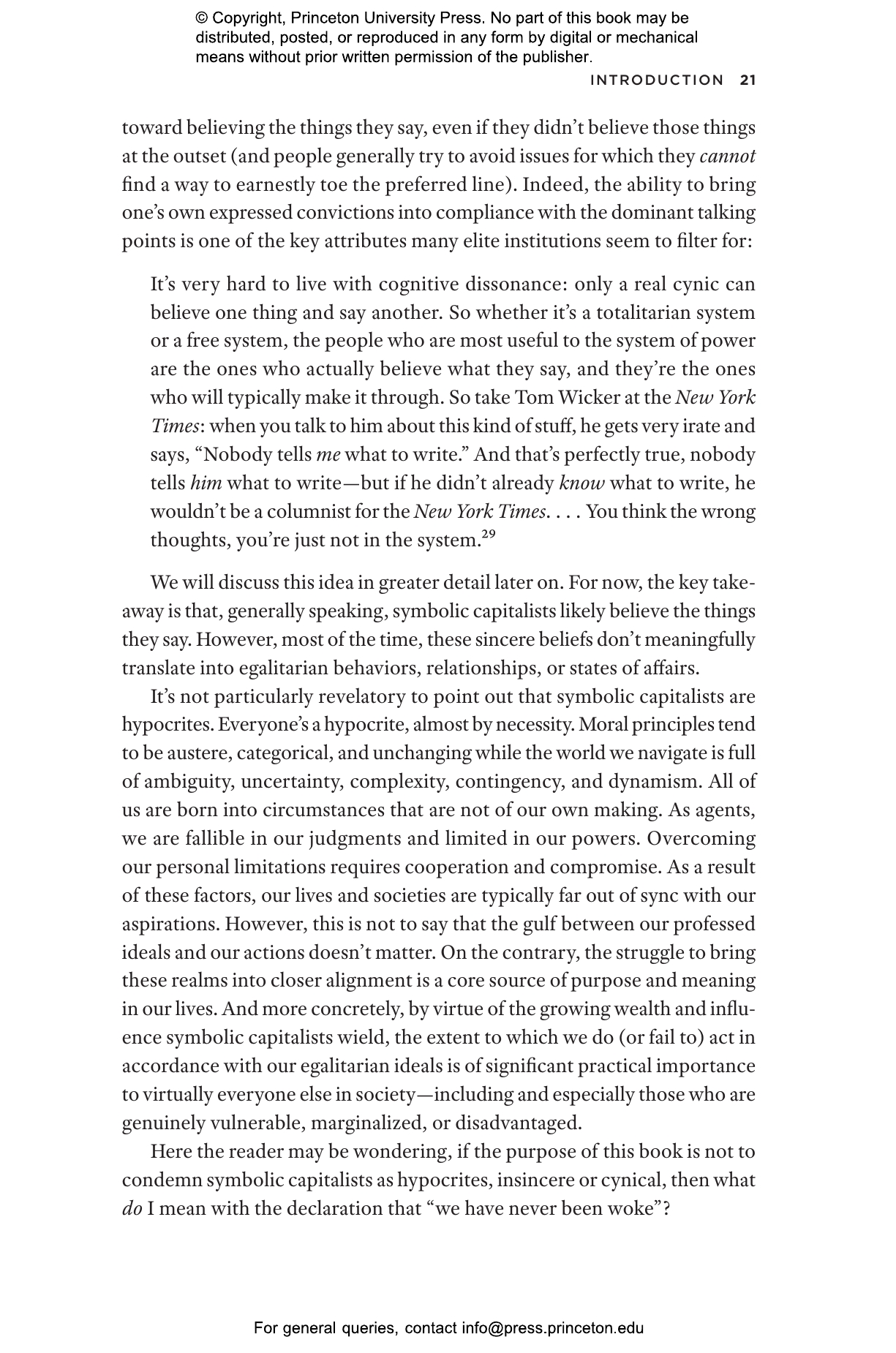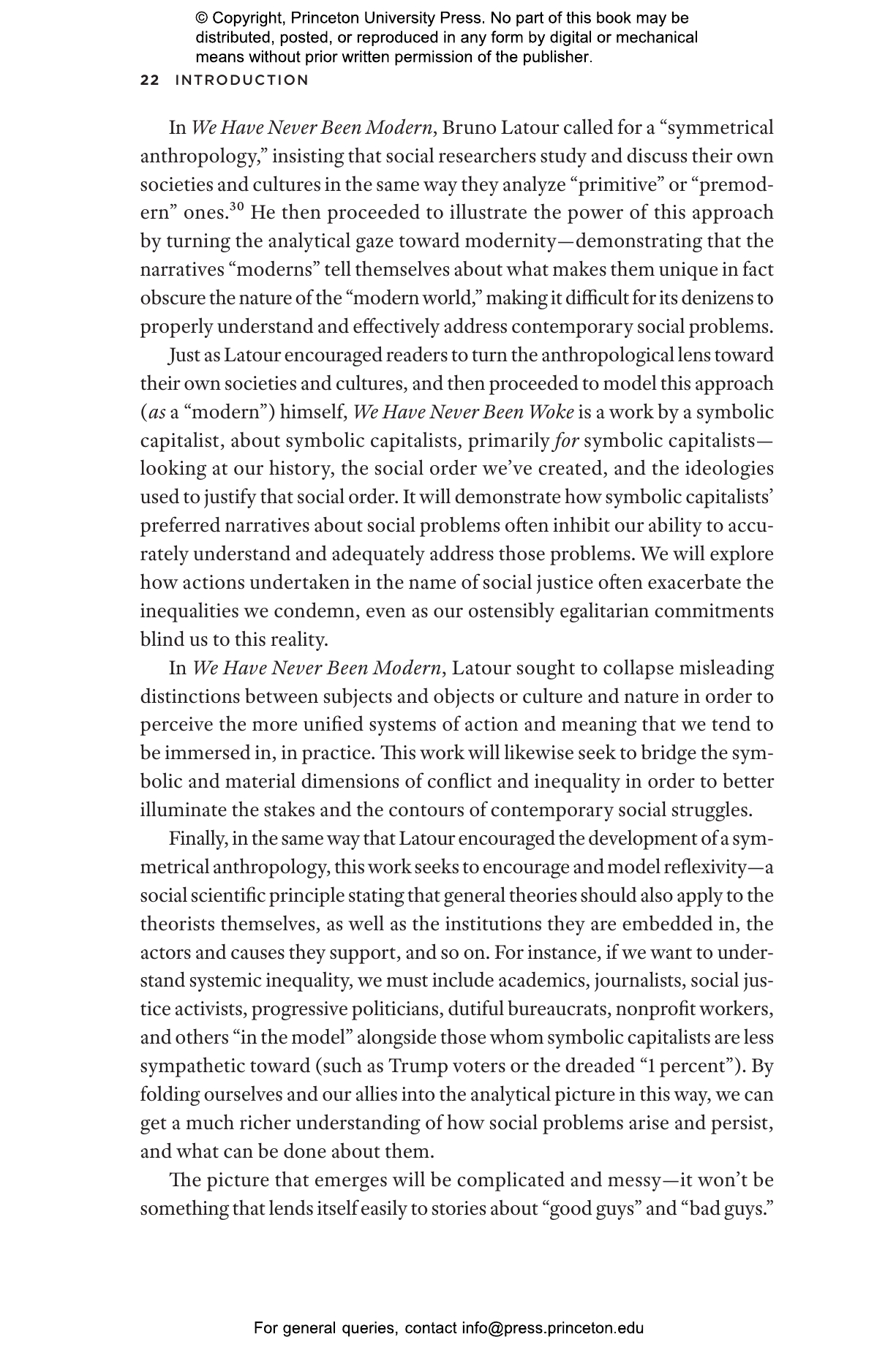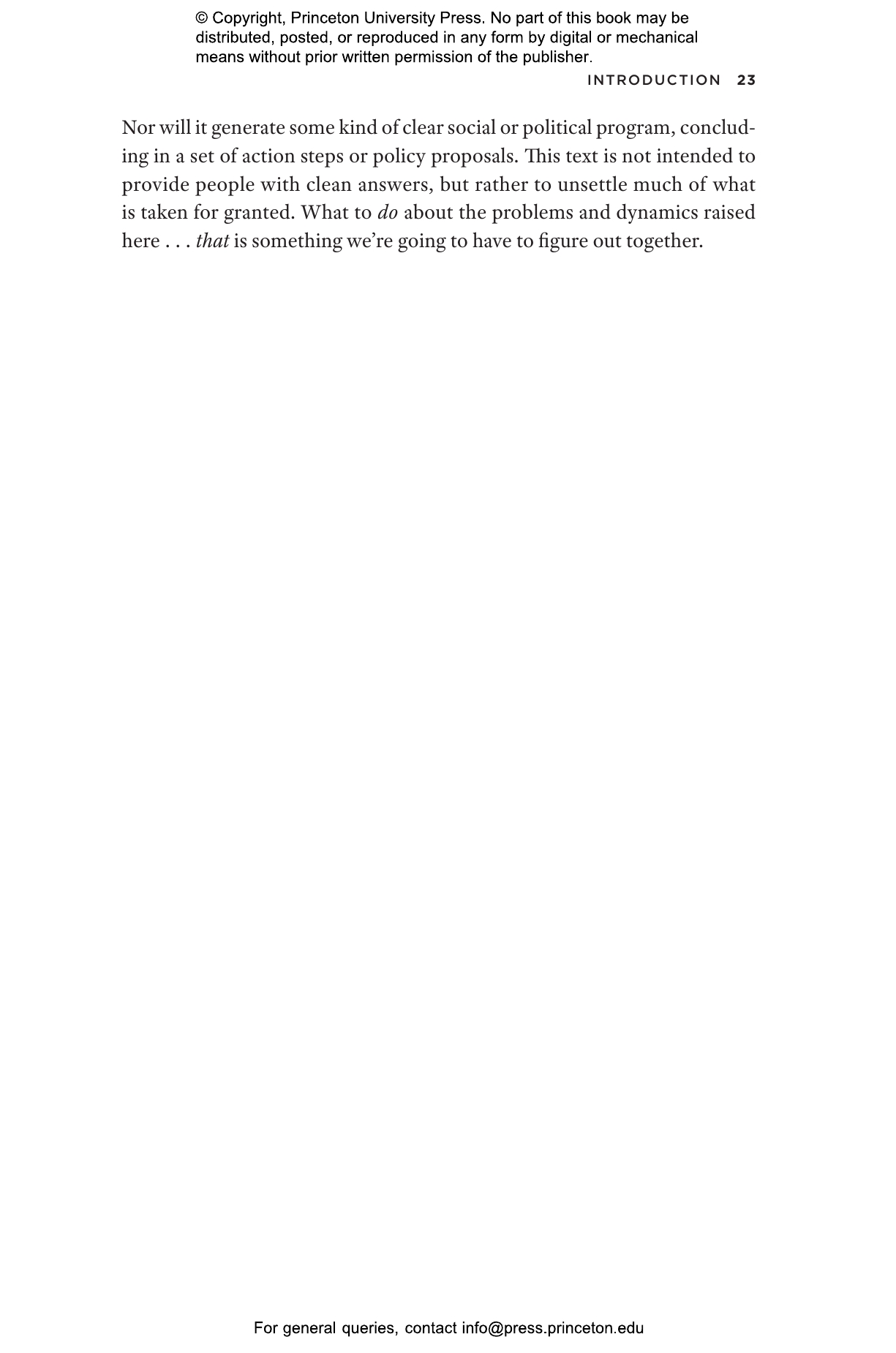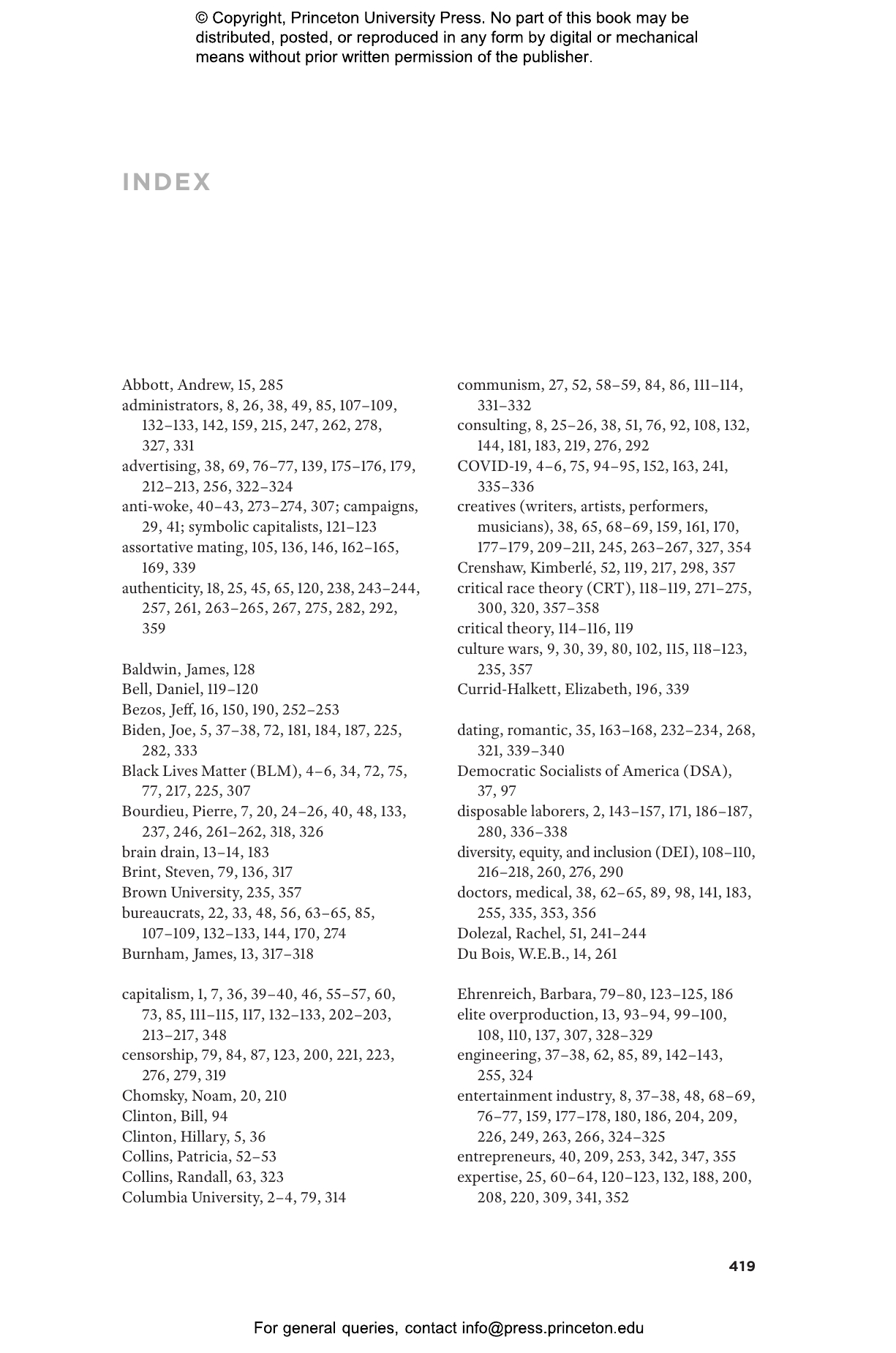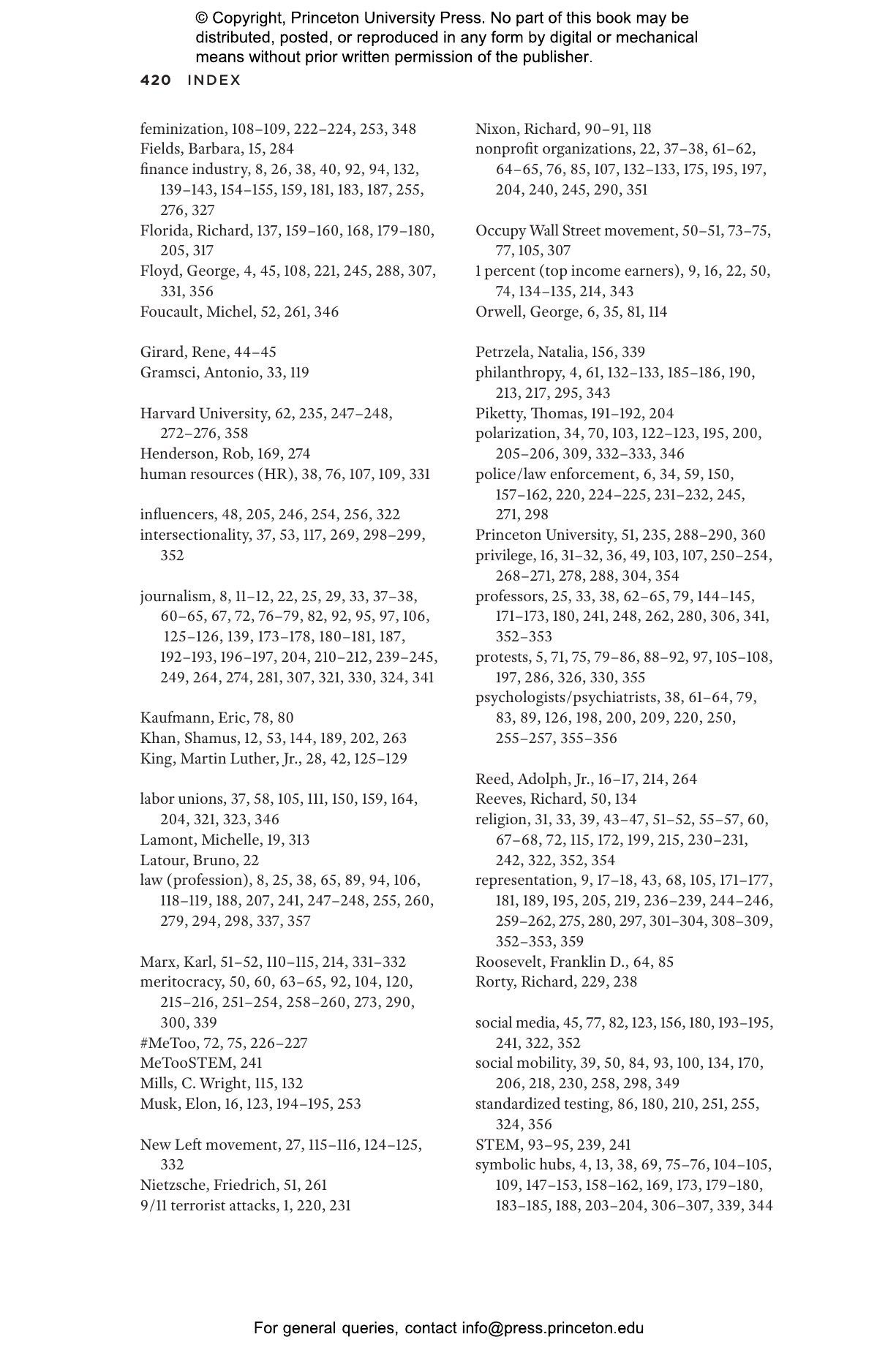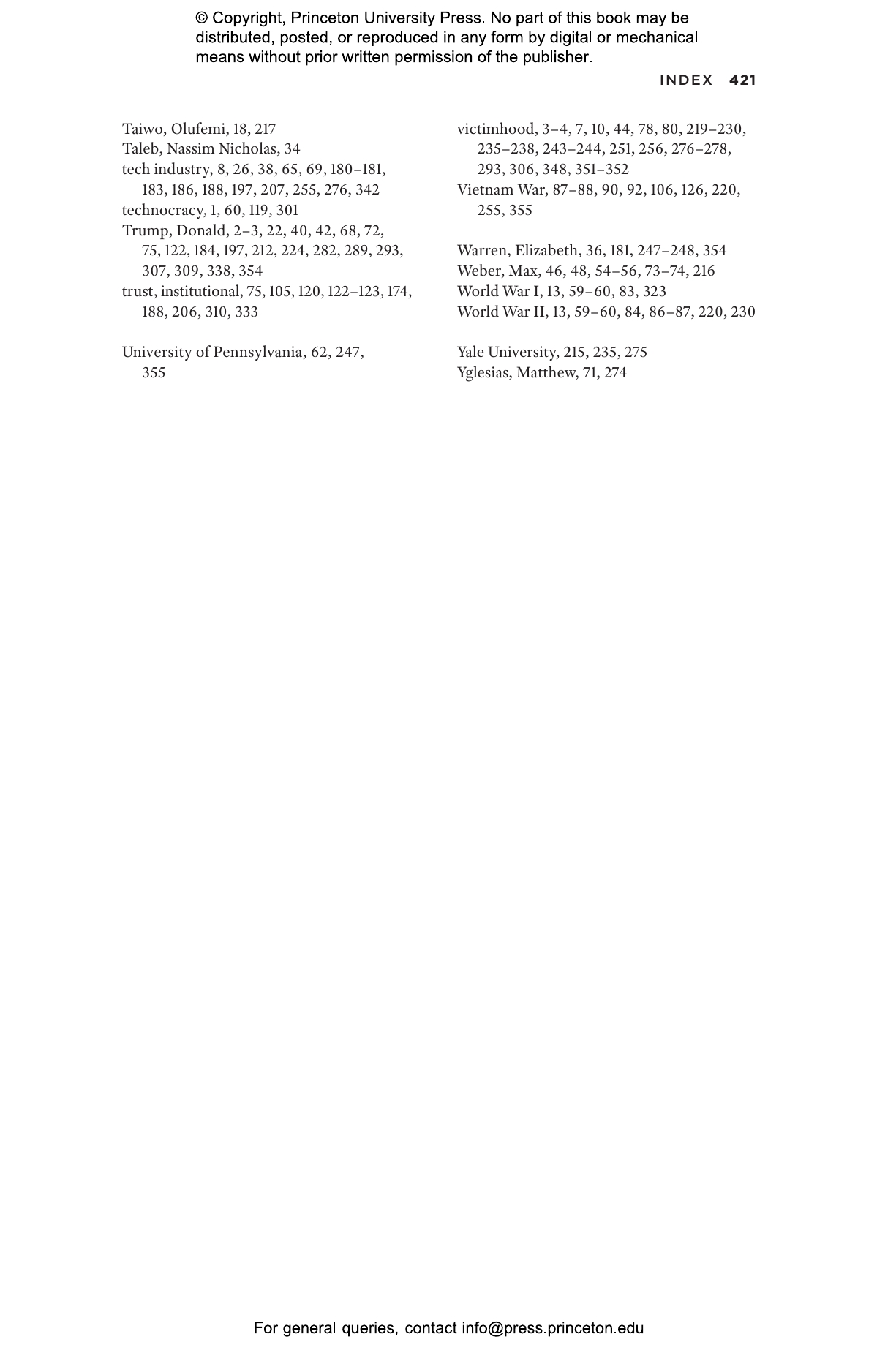Society has never been more egalitarian—in theory. Prejudice is taboo, and diversity is strongly valued. At the same time, social and economic inequality have exploded. In We Have Never Been Woke, Musa al-Gharbi argues that these trends are closely related, each tied to the rise of a new elite—the symbolic capitalists. In education, media, nonprofits, and beyond, members of this elite work primarily with words, ideas, images, and data, and are very likely to identify as allies of antiracist, feminist, LGBTQ, and other progressive causes. Their dominant ideology is “wokeness” and, while their commitment to equality is sincere, they actively benefit from and perpetuate the inequalities they decry. Indeed, their egalitarian credentials help them gain more power and status, often at the expense of the marginalized and disadvantaged.
We Have Never Been Woke details how the language of social justice is increasingly used to justify this elite—and to portray the losers in the knowledge economy as deserving their lot because they think or say the “wrong” things about race, gender, and sexuality. Al-Gharbi’s point is not to accuse symbolic capitalists of hypocrisy or cynicism. Rather, he examines how their genuine beliefs prevent them from recognizing how they contribute to social problems—or how their actions regularly provoke backlash against the social justice causes they champion.
A powerful critique, We Have Never Been Woke reveals that only by challenging this elite’s self-serving narratives can we hope to address social and economic inequality effectively.
"[We Have Never Been Woke] announces [al-Gharbi] as a rising intellectual star."—David Brooks, New York Times
"If you want to understand what just happened in the [2024] US election, it [We Have Never Been Woke] is one of the more useful starting points."—Kenan Malik, Observer
"illuminating.... For anyone genuinely curious about why working-class, culturally conservative Americans, many of them evangelical Christians, remain so loyal to Trump, We Have Never Been Woke is required reading. In a book that’s both granular in its detail and panoramic in its perspective, al-Gharbi builds a tightly argued case for how the “Great Awokening” is neither particularly novel nor particularly helpful to the marginalized and disenfranchised of American society."—Carrie McKean, Christianity Today
"a necessary corrective to the hackneyed discourse around wealth and privilege that has obtained since 2008."—Thomas Chatterton Williams, The Atlantic
"one of the most historically rigorous and empirically grounded investigations of “wokeness” we have.... Encyclopedic in breath, and painstakingly in-depth, We Have Never Been Woke establishes al-Gharbi as one of the most insightful and provocative sociologists of his generation."—Adam Szetela, Washington Post
"A book I’ve been waiting for someone to write for a long time…a damn good book."—Jesse Singal, Blocked and Reported
"sprawling, ambitious, and perceptive...We Have Never Been Woke...raises too many provocative questions and gores too many oxen across the political spectrum to let anybody feel very complacent. It’s a highly erudite book, idiosyncratically straddling the line between an academic publication and a broader interest page-turner, that, at its sharpest, transcends all of the citations and footnotes to achieve a pungent first-person sociological and psychological clarity."—Jesse Adams, Washington Examiner
"We Have Never Been Woke is a great book on wokeness, probably the most incisive and interesting one that’s been written. It also holds appeal as a work on political beliefs, as a work of political sociology, and as an incredibly well-sourced piece of cultural criticism. It is very much worth reading."—Oliver Traldi, City Journal
"A brilliant, rare academic book."—Sarah Baxter, The Standard
"[al-Gharbi is] the Alexis de Tocqueville of this moment."—Frank Schaeffer, In Conversation...with Frank Schaeffer
"A sharp, well-researched critique aimed at politically active readers who want to better understand why people believe what they believe."—Library Journal
"A sharp critique of the ways many of us, on all sides of politics and culture, have used social justice as a subtle way to serve ourselves."—Lee C. Camp, No Small Endeavor
"Al-Gharbi avoids denunciation in favour of sober, rigorous analysis. For this and other reasons, I suspect it is the only book on the subject that will still be worth reading in a decade.... What We Have Never Been Woke offers, in contrast, is demystification. In eschewing the self-aggrandisement and moralism typical of woke and anti-woke literature alike, al-Gharbi offers a model for others to follow."—Geoff Shullenberger, Unherd
"Mr. al-Gharbi compares what symbolic capitalists say to what they do and finds a pronounced, lamentable gap.... [his] effort to move proudly analytic symbolic capitalists to analyze themselves is important. He is mainly in the business of describing not moralizing."—Jonathan Marks, Wall Street Journal
"provocative and compelling .... it may be that the most significant lesson of al-Gharbi’s book is not that the Left is hypocritical but that, as a society, we care too much about symbols. Politicians, it is said, will always disappoint you. Al-Gharbi’s view is that symbols will, too — regardless of who endorses them."—Michael C. Behrent, National Review
"One can only admire al-Gharbi’s fearlessness…. Probably to his credit, al-Gharbi puts the best possible face on a reality that is variously amusing, infuriating, and even occasionally relieving…. By the end of the book, it is hard to think of a faux-sacred cow al-Gharbi has failed to expose…. The core of We Have Never Been Woke is persuasive, and it’s hard not to see his thesis in operation in all kinds of fields, once you look at the world his way."—Aaron Weinacht, Front Porch Republic
"We Have Never Been Woke...provides a fascinating analysis drawing from both philosophy and empirical research. No one has done a better job of pointing out the chasm between the educated left’s behavior and its alleged goal of equality."—Robert VerBruggen, Washington Free Beacon
"In six compelling and comprehensive chapters, Al-Gharbi lays out his case… Al-Gharbi brings to bear the sociological data that illustrate the actual harm upon our societies by the elite claims to victimhood which underlie a culture of ‘wokeness.'"—Guy Lancaster, Marx & Philosophy Review of Books
"Musa al-Gharbi presents a thorough and provocative critique of the contemporary woke movement and its cultural contradictions.... Following Bourdieu, the author brilliantly portrays symbolic capitalists.... Al-Gharbi urges us to reconsider what true progressivism should look like and how to build a more inclusive movement that addresses the material concerns of all people, rather than focusing solely on the symbolic victories of a privileged few."—Pedro Ángel Palou, El Heraldo de México
"As sociologist Musa al-Gharbi notes in..."We Have Never Been Woke,” the 2020 reckoning over racial injustice raised expectations for a new era, but little changed materially.... Today, another reckoning is in order."—Shadi Hamid, Washington Post
"The main excellence of al-Gharbi’s book lies not in the originality of this central insight but in how the author has meticulously, systematically, and extensively documented its truth."—Gene Callahan, Kirk Center
"Al-Gharbi manages to put forth a veritably meta-discursive commentary on current events thanks in part to his reliance on concrete facts and extensive research as his point of departure, but perhaps even more so to his commitment to intellectual virtue over performative posturing. Written with a remarkable sense of humility and with charity for those he critiques, his work comes off more as a labor of love than as a polemic… Al-Gharbi is refreshingly unafraid of letting the facts speak for themselves"—Stephen G. Adubato, Real Clear Books
"To some extent We Have Never Been Woke: The Cultural Contradictions of a New Elite by Musa al-Gharbi prepared me for the election result.... To understand [his] argument, I needed to not just check my priors at the door, but also admit that I am part of the problem, part of the “new elite” of al-Gharbi’s title.... Today, when I’m casting around for who to blame, I’m also looking in the mirror. If you think I am wrong to do so, I suggest you read We Have Never Been Woke by Musa al-Gharbi"—Ethan Iverson, Transitional Technology
"We recommend...We Have Never Been Woke as a common reading for colleges and universities. Al-Gharbi offers a most incisive analysis of the political economy of the knowledge sector."—Amna Khalid and Jeffrey Aaron Snyder, Chronicle of Higher Education
"This is a brilliant book, a masterpiece of relentless, careful, creative destruction." —Thomas Frank, author of What's the Matter With Kansas?
“In this important and timely book, Musa al-Gharbi describes the rise of the ‘symbolic capitalists,’ and how an ideology has evolved to cement their power and restrict entry from outsiders. We Have Never Been Woke effectively addresses a wide readership on this contentious issue.”—Tyler Cowen, George Mason University
“Uncomfortable and eye-opening, We Have Never Been Woke puts in sharp relief the contradictions of cultural elites who champion important social causes while they simultaneously, and perhaps obliviously, perpetuate inequities and inequalities in their own daily lives.”—Elizabeth Currid-Halkett, author of The Sum of Small Things: A Theory of the Aspirational Class
“In this smart, discerning, and indispensable book, Musa al-Gharbi lays much needed and essential groundwork for understanding what the phrase ‘woke’ really means and where it comes from. Mistakenly pegged as the clarion call of so-called social justice warriors, woke represents a corruption of the liberal tradition at the hands of the new symbolic capitalists who sit atop today’s economy. An essential read for all those seeking to overcome self-serving narratives and address social disadvantage more effectively.”—Richard Florida, author of The Rise of the Creative Class
“Our interminable culture war is marked by bluster and bomb-throwing that produces more heat than light. Musa al-Gharbi rises above the fray with a book that is certain to become the definitive account of elite social justice discourse and its myriad hypocrisies. We Have Never Been Woke is mandatory reading for anyone who wants to understand the social and economic forces that sustain both performative progressivism and its critics.”—Tyler Austin Harper, Bates College
